
Research practice event archive
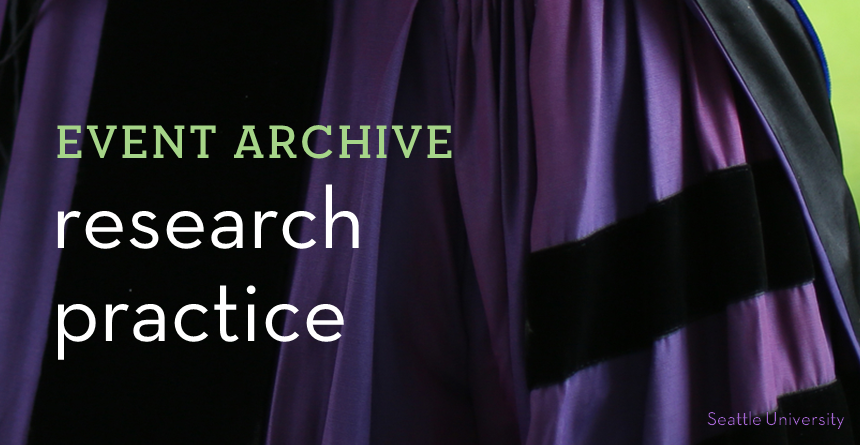
Below you will find an archive of our past events and programs on research practice topics, listed in reverse chronological order. The Center for Faculty Development staff are able to consult with Seattle University faculty on any of these topics, and many other research practice topics, as well.
Click the red plus below the year in order to view that year's list of events.
2023–24
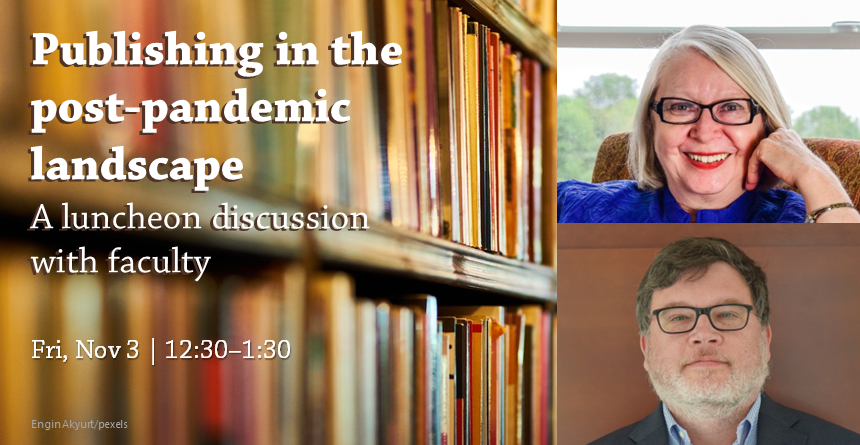
-
23FQ Publishing in post-pandemic landscape – details
-
Panel discussion
Publishing in the post-pandemic landscape: A luncheon discussion with faculty
Fri, Nov 3 | 12:30–1:30 | In person | Student Center 210 | Lunch provided
Co-sponsored by the Seattle U Center for Ecumenical and Interreligious Engagement, the Center for Faculty Development, and the Office of Sponsored Projects
Moderated by Michael Trice (Center for Ecumenical and Interreligious Engagement)
How has the world of publishing changed in the wake of the Covid pandemic? What do these changes imply for writers and scholars in the academy? Find out in a moderated conversation on the opportunities and challenges of publishing today, from the perspective of two executives in the industry. Our panelists are:
- Al Bertrand, current Director and Editor-in-Chief of Georgetown University Press.
- Beth Lewis, President/CEO Emeritus of 1517 Media/Fortress Press with 20+ years of prior publishing experience with Time Warner, McGraw-Hill and Times Mirror.
Come join us with your publishing-related questions for a Q&A portion of the session.
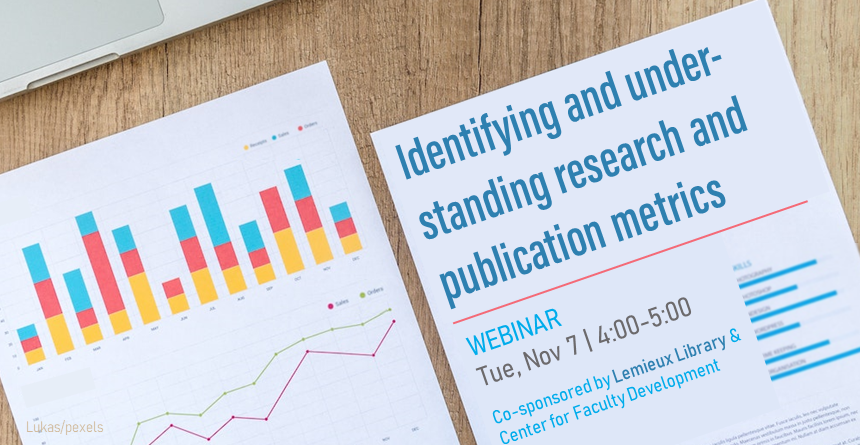
-
23FQ Research & publication metrics - Details
-
Webinar
Identifying and understanding research and publication metrics
Tue, Nov 7 | 4:00–5:00 | Via Zoom | Zoom link provided upon registration
Co-sponsored by the Lemieux Library & McGoldrick Learning Commons and the Center for Faculty Development
Facilitated by Yen Tran, Associate Librarian & Scholarly Services Librarian (Lemieux Library & McGoldrick Learning Commons)
Knowing the impact of your research can help with many things, including:
- supporting applications for tenure, promotion, or for annual reviews,
- quantifying and determining how your research is being used, and
- justifying and strengthening requests for grants and other types of funding.
With various tools and types of metrics, identifying and understanding the research and publication metrics can be cumbersome.
In this session, you will be introduced to the different types of metrics and the tools you can use to gather them. The research and publication metrics to be discussed include citation tracking, journal impact, book impact, researcher impact, social and cultural impact, and alternative metrics. There will also be time for you to explore the tools and conduct your own searches.
» Register
2022–23
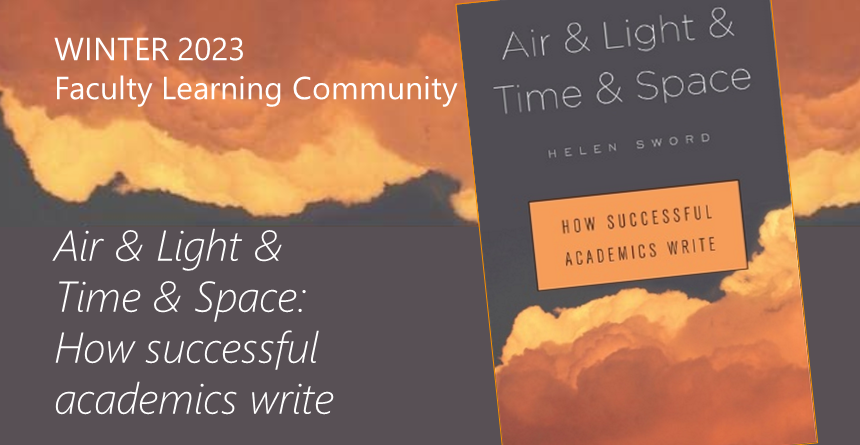
-
23WQ FLC Air & Light & Time & Space - details
-
Faculty Learning Community
Air & Light & Time & Space: How successful academics write
Mondays: Jan 30, Feb 13, and Feb 27 | 11:00–12:15 | In person | Casey 220 | Tea, coffee, and snacks provided
Facilitated by David Green
How do successful academics find the “air and light and time and space” (in the words of poet Charles Bukowski) to get their research done? How do they go about their writing process? And how do they summon up the courage to take intellectual risks and the resilience to deal with rejection?
From interviews with one hundred faculty members around the world, Helen Sword identifies four cornerstones that anchor any successful research and writing practice:
- Behavioral habits of discipline and persistence;
- Artisanal habits of craftsmanship and care;
- Social habits of collegiality and collaboration; and
- Emotional habits of positivity and pleasure.
Building on this “BASE,” Sword illuminates the emotional complexity of the research and writing process and exposes the lack of research and writing support typically available to early career academics. She also lays to rest the myth that academics must produce safe, conventional prose or risk professional failure.
In this three-session Learning Community, facilitated by David Green (Center for Faculty Development), we’ll work our way through the chapters of the book, identifying our own writing BASEs, as well as exploring which strategies from the book draw us in and which send us running to the hills.
The successful writers profiled in the book tell stories of intellectual passions indulged, disciplinary conventions subverted, and risk-taking rewarded. Grounded in empirical research and focused on sustainable change, Sword’s book offers a customizable blueprint for refreshing your personal research and writing habits and creating a collegial environment where all writers can flourish.
What can you expect?
Over the three sessions, you'll:
- Identify your own research and writing habits to date to find out your “BASE.”
- Discover different approaches that could enrich your research practice.
- Have an opportunity to practice new ideas and report back on them.
Who is it suited to?
This book may be especially suited to early career faculty, as well as to faculty who are seeking to reboot their approaches to their research and writing.
Air & Light & Time & Space is 206 pages long, and reading will be split across the three sessions to be manageable for participants.
What are the dates?
This learning community meets in Casey 220 on:
- Mon, Jan 30 | 11:00–12:15
- Mon, Feb 13 | 11:00–12:15
- Mon, Feb 27 | 11:00–12:15
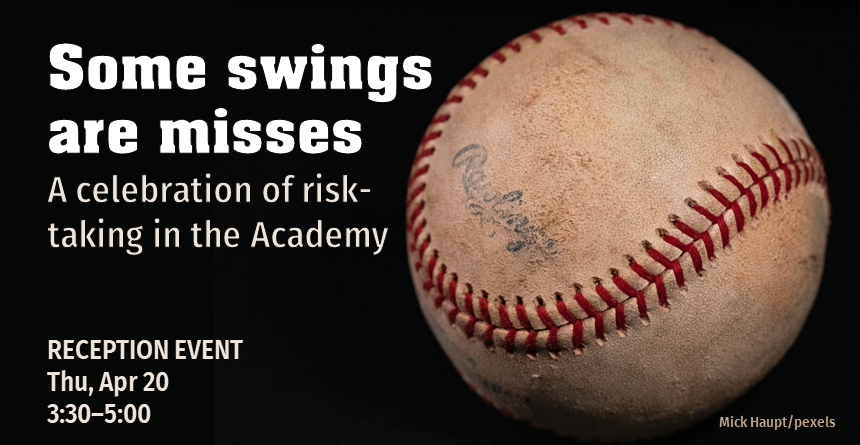
-
23SQ Some swings are misses - details
-
Reception Event
Some swings are misses: A celebration of risk-taking in the Academy
Thu, Apr 20 | 3:30–5:00 | In person | Student Center 130 | Appetizers, beer, wine, and non-alcoholic beverages will be served
Co-sponsored by the Office of Sponsored Projects and the Center for Jesuit Education
Hosted by David Green, Katherine Raichle, and Andrea Verdan
Spring is typically the time of year when universities around the country are looking back and toasting the successes of the past 12 months.
Less celebrated – but no less important – are all those instances of risk-taking over the past 12 months that didn’t lead to the results we had hoped for, such as
- Articles, chapters, and conference papers that were rejected
- Learning activities, assignment designs, and course designs that didn't work as intended
- Grants, fellowships, and funding applications that didn't come through
- Applications that were turned down
- Conference sessions that no one showed up for.
Academia is full of such moments, yet we rarely acknowledge them publicly. As author Helen Sword (2017, p. 178) writes, “habitual risk takers understand that failure, too, is worth celebrating,” and with that in mind, the Center for Faculty Development, Office of Sponsored Projects, and Center for Jesuit Education are co-sponsoring this celebration of risk-taking. This is a chance for us to toast our valiant efforts, recognizing that – to quote Einstein – “Failure is success in progress.”
For this informal reception and celebration to go ahead, we need confirmation of at least 30 “swings that were misses” from attending faculty. So when you register, be sure to let us know what miss(es) we can anonymously add to the list.
» Register
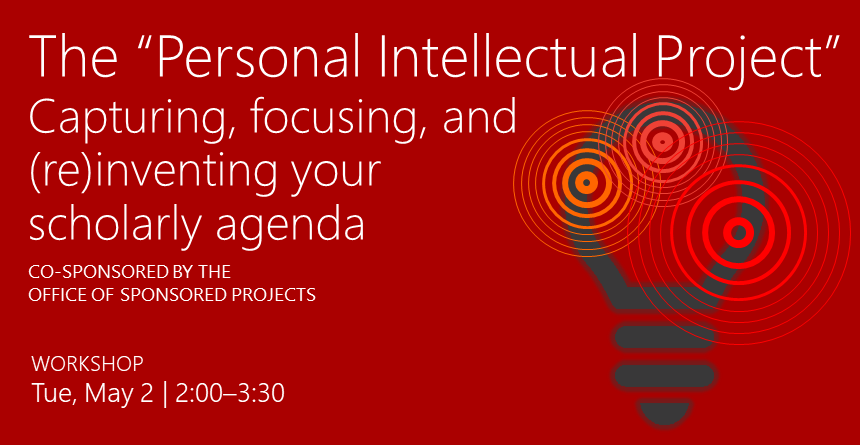
-
23SQ Personal intellectual project - details
-
Workshop
The "Personal Intellectual Project": Capturing, focusing, and (re)inventing your scholarly agenda
Tue, May 2 | 2:00–3:30 | In person | Casey Commons (CASY 530) | Tea and coffee provided
Co-sponsored by the Office of Sponsored Projects
Facilitated by David Green
Spring is often the time when faculty are preparing their files for promotion or tenure, or are reflecting on their work to date to help clarify their summer projects.
Yet depending on our career stage, our scholarly agenda can pose a variety of challenges. For many newer scholars, it can be hard to step back and identify exactly what we’re doing – and why it matters. For more seasoned researchers, in contrast, we often find our passions have shifted to new topics, or that we need to reinvent ourselves as scholars in somewhat different academic fields than where we began.
Difficulty in describing our research arc can affect our chances of winning grants, of being promoted, or simply of feeling in control of our own scholarship. It can lead us to take on projects that don’t exactly align with our expertise or intellectual curiosity, and to missing out on those that do.
In this session, we’ll provide a space for you to think through your own “Personal Intellectual Project”—the big-picture encapsulation of your different scholarly topics and agendas. For newer scholars, can you sense its form yet? Do you recognize the parameters you want to set to keep it manageable? For more experienced scholars, has your intellectual project evolved since you last considered it? What has changed and what remains the same? What projects might reignite your enthusiasm?
Through a structured process and through interdisciplinary small-group conversation, you’ll be better placed to advocate for yourself and your scholarship and will have a clearer vision of viable and enticing scholarly topics for the future.
Be sure to have a copy of your up-to-date CV with you for the session.
Optional follow-up session
Attendees who would like to check back in on this topic can do so in an hour-long discussion and debrief.
Tue, May 16 | 2:00–3:00 | In person | Casey Commons (CASY 530) | Tea and coffee provided
» Register
2021–22
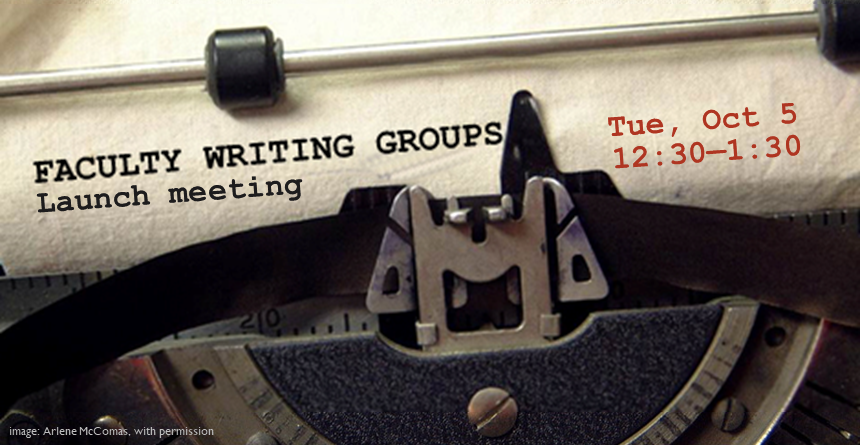
-
21FQ Faculty Writing Groups - details
-
Launch Meeting
Faculty Writing Groups - organized by your career stage
Tue, Oct 5 | 12:30–1:30 | Zoom link provided upon registration
Co-sponsored by the Office of Sponsored Projects (OSP)
Facilitated by David Green and Kara Luckey
The “research on research” gives us good evidence on what helps faculty progress with their research, and in response, we’ve been launching Faculty Writing Groups since 2007. These groups provide you with camaraderie and accountability to achieve more in your scholarship. And they are intentionally interdisciplinary so that you remain the expert in your own field throughout.
We also aim to group you with peers at a similar career stage so that no one feels the need to mentor or to request mentoring within the group.
By the end of this session, you will be grouped with two or three other colleagues from across campus and will be ready to meet with your group independently and regularly to help you achieve more in your research – and with less stress.
Click here for our webpage with full details on Faculty Writing Groups.
» Register
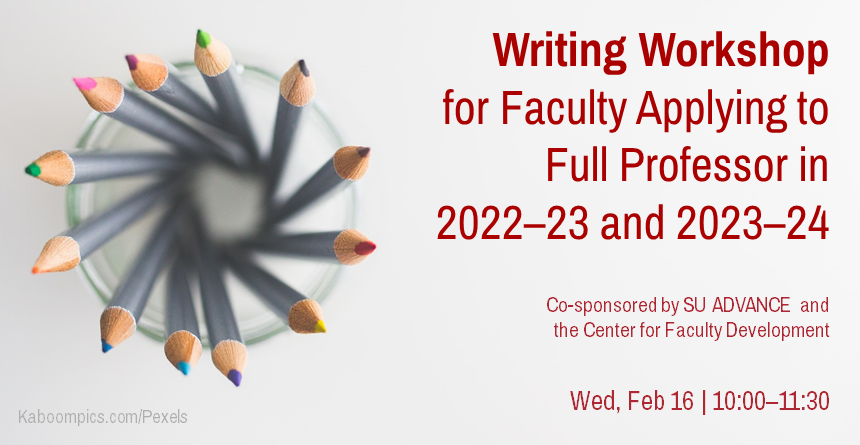
-
22WQ Writing workshop for faculty applying to Full Professor - details
-
Workshop
Writing Workshop for Faculty Applying to Full Professor in 2022–2023 and 2023–2024
Wed, Feb 16 | 10:00–11:30 | Zoom link provided upon registration
Co-sponsored by the SU ADVANCE program and the Center for Faculty Development
Co-facilitated by Jodi O'Brien (Principal Investigator, ADVANCE grant; Special Assistant to the Provost for Faculty Development) and Jean Jacoby (Co-Principal Investigator, ADVANCE grant; Associate Dean, College of Science & Engineering)
If you are seeking promotion to full professor in the next two years, then this writing workshop is for you.
The university’s revised promotion guidelines for Full Professor include a new requirement for faculty to develop their own “Holistic Faculty Development Plan” (HFDP), beginning Fall 2022. The HFDP provides faculty an opportunity to articulate their own individual professional trajectory and interests.
This online workshop offers support and opportunities for writing and reflection for those of you planning to apply for promotion in the next two years (i.e., submitting your promotion file in Fall 2022 or Fall 2023). Although an HFDP is an individual effort, we will discuss some of the generalizable guiding principles that underpin this holistic plan.
If you are unsure whether you will apply for promotion the next two years, please email Sarah Trainer at trainers@seattleu.edu for more information.
Please register by February 9. You will then receive the meeting information and Zoom link.
» Registration is now closed.
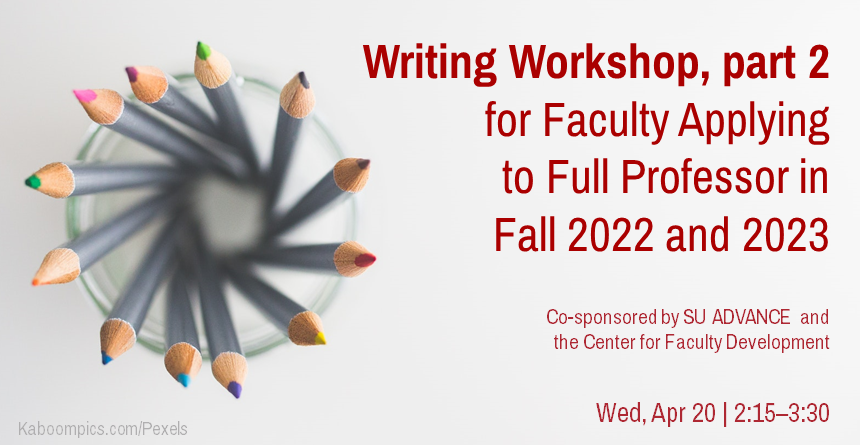
-
22SQ Writing workshop Part 2 for faculty applying to full professor - details
-
Afternoon Workshop
Writing Workshop Part 2: for faculty applying to Full Professor in Fall 2022 and Fall 2023
Wed, Apr 20 | 2:15–3:30 | Zoom link provided upon registration
Co-sponsored by the SU ADVANCE program and the Center for Faculty Development
Facilitated by Jodi O'Brien (Principal Investigator, ADVANCE grant; Special Assistant to the Provost for Faculty Development)
This April session is a follow-up to our February workshop and is intended to provide support and opportunities for writing and reflection to faculty aiming to apply for promotion in the next two years under the university’s revised Promotion Guidelines for Full Professor.
As a reminder, faculty seeking promotion in AY 2022-2023 or AY 2023-2024 do not need to produce evidence of a multi-year Holistic Faculty Development Plan (HFDP). Faculty seeking promotion during this period do, however, need to produce evidence of a thoughtful, integrated file.
This workshop is open only to faculty who intend to apply for promotion to full professor in Fall 2022 or Fall 2023.
Please register by April 13. You will then receive the meeting information and Zoom link.
» Registration is now closed
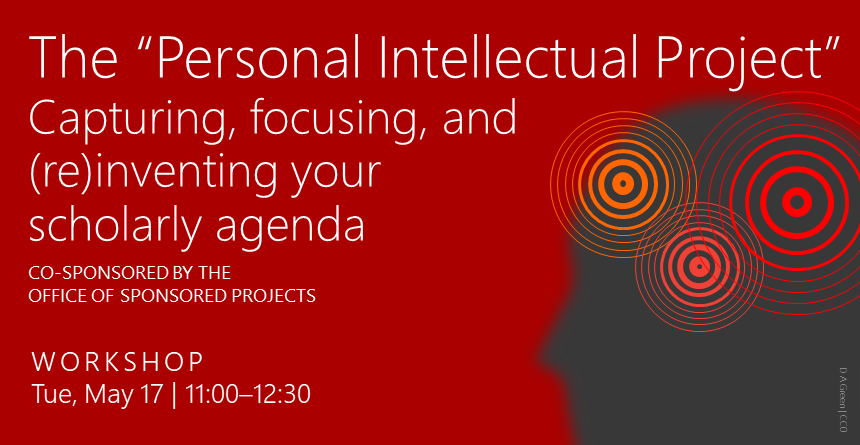
-
22SQ Personal Intellectual Project - details
-
Morning Workshop
The Personal Intellectual Project: Capturing, focusing, and (re)inventing your scholarly agenda
Tue, May 17 | 11:00–12:30 | Zoom link provided upon registration
Co-sponsored by the Office of Sponsored Projects (OSP)
Facilitated by David Green
Spring is often the time when faculty are preparing their files for promotion or tenure, or are reflecting on their work to date to help clarify their summer projects.
Yet depending on our career stage, our scholarly agenda can pose a variety of challenges. For many newer scholars, it can be hard to step back and identify exactly what we’re doing – and why it matters. For more seasoned researchers, in contrast, we often find our passions have shifted to new topics, or that we need to reinvent ourselves as scholars in somewhat different academic fields than where we began.
Difficulty in describing our research arc can affect our chances of winning grants, of being promoted, or simply of feeling in control of our own scholarship. It can lead us to take on projects that don’t exactly align with our expertise or intellectual curiosity, and to missing out on those that do.
In this session, we’ll provide a space for you to think through your own “Personal Intellectual Project”—the big-picture encapsulation of your different scholarly topics and agendas. For newer scholars, can you sense its form yet? Do you recognize the parameters you want to set to keep it manageable? For more experienced scholars, has your intellectual project evolved since you last considered it? What has changed and what remains the same? What projects might reignite your enthusiasm?
Through a structured process and through interdisciplinary small-group conversation over Zoom, you’ll be better placed to advocate for yourself and your scholarship and will have a clearer vision of viable and enticing scholarly topics for the future.
Be sure to have a copy of your up-to-date CV with you for the session.
» Registration is now closed.
2020–21
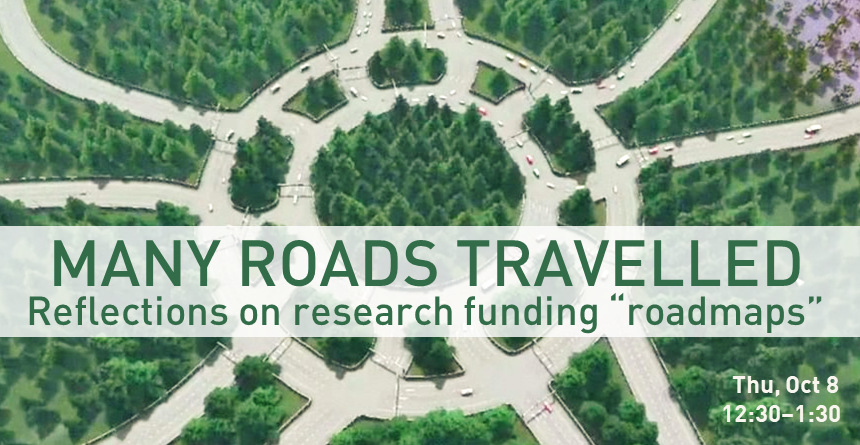
-
20FQ Many roads travelled - details
-
Lunchtime Panel Discussion
Many roads travelled: Reflections on research funding “roadmaps”
Thu, Oct 8 | 12:30–1:30 | Zoom link provided upon registration
Co-sponsored by the Center for Faculty Development
Facilitated by Kara Luckey (Office of Sponsored Projects)
Please join us as SU faculty from a range of disciplines and career stages share the ”roadmaps” they have followed in developing their funded research programs, and the ways in which external support has shaped their trajectories. In addition to learning from colleagues, participants will gain practical insight into approaches to developing a research funding plan that maps pathways for achieving long-term research and funding goals. We are grateful to the following faculty who will be joining us to share their perspectives:
- Elizabeth Dale, Assistant Professor of Nonprofit Leadership, College of Arts and Sciences
- Matt Hickman, Professor of Criminal Justice, College of Arts and Sciences
- Kristin Hultgren, Associate Professor of Biology, College of Science and Engineering
- Mo Sin, Associate Professor of Nursing, College of Nursing
*Note: This event is facilitated by the Office of Sponsored Projects, and co-sponsored by the Center for Faculty Development. The registration form for this session is separate from other Center events.
»Registration is now closed
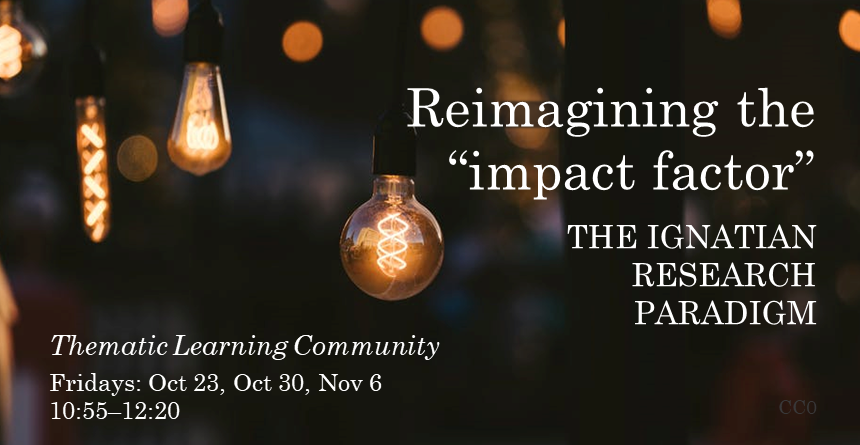
-
20FQ TLC - Ignatian Research Paradigm - details
-
Thematic Faculty Learning Community
Reimagining the “Impact Factor”: The Ignatian Research Paradigm
Co-sponsored by the Center for Jesuit Education, the SU ADVANCE Program, the Institute for Catholic Thought and Culture, and the Center for Faculty Development
Facilitated by Kristi Lee (College of Education) and Jen Tilghman-Havens (Center for Jesuit Education)
How can faculty scholarship contribute to the common good? How does Seattle University’s Jesuit mission invite a reimagining of research and scholarship in light of our distinctive place within the academy? This Thematic Faculty Learning Community will explore these questions in light of the university’s mission and through the directives of the SU Advance Program (an NSF-sponsored grant to examine pathways to promotion for women faculty in STEM and beyond).
What's in it for you?
Faculty will be inspired to reimagine their own scholarly agendas within an evolving mission-inspired paradigm. This three-part Thematic Faculty Learning Community will:
- introduce faculty to a newly conceptualized framework, the Ignatian Research Paradigm, which critiques the industry standard of using measurements like the “impact factor,” and instead suggests a larger conception of “impact.”
- invite faculty into conversation with other scholars engaged in mission-based research (community-engaged research, scholarship for equity and justice, etc.)
- engage faculty in a process to reflect on their own passions and interests as they develop their next research agenda.
Participants will also receive a stipend of $100 upon completion.
The foundational work for this series was recently presented to a summit of the Jesuit universities on the West Coast.
Who is it suited to?
All faculty will be invited to attend. We imagine this series being of particular interest to new faculty as well as faculty recently promoted to Associate or Full Professor.
What are the dates?
The three dates in Fall Quarter are:
- Fri, Oct 23 | 10:55–12:20 | Zoom link to follow
- Fri, Oct 30 | 10:55–12:20 | Zoom link to follow
- Fri, Nov 6 | 10:55–12:20 | Zoom link to follow
How do I apply?
To apply for the Ignatian Research Paradigm Learning Community, please complete this application form on Survey Monkey by Monday, September 28 at 12:00pm.
We will notify all applicants of their participation by Friday, October 2 at 5:00pm.
Please be sure to block off the three sessions in your calendar when you apply so that you are definitely available.
Any questions about the series can be directed to Kristi Lee (leekrist@seattleu.edu) or Jen Tilghman-Havens (tilghman@seattleu.edu).
*The application form for this series is separate from the registration form for other Center events.
»Applications are now closed
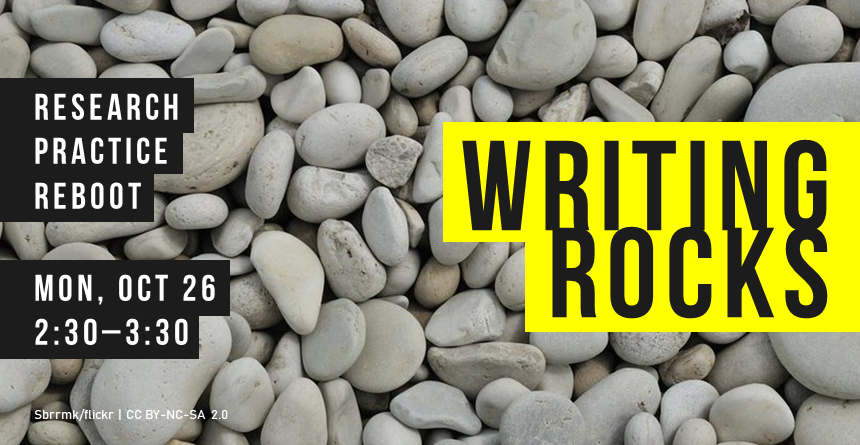
-
20FQ Writing rocks - details
-
Research Practice Reboot
Writing rocks
Mon, Oct 26 | 2:30–3:30 | Zoom link provided upon registration
Facilitated by Holly Slay Ferraro and David Green
Many of us experience forms of resistance to working on our scholarship – the terror of the blank page, the feeling that there’s never enough time, the pressure of other urgent tasks, and so on. So how do we navigate our way around our resistance to ensure that we nudge our scholarly agendas forward?
In this one-hour session, we’ll explore the “Writing Rocks” method devised by Kerry Ann Rockquemore, founder of the National Center for Faculty Development and Diversity (which you can also join as an SU faculty member). This method allows us to build up our scholarship in manageable chunks of time (from “pebbles” to “stones” to “boulders”) so that we can circumvent the various forms of inner resistance we may face at each stage in the process.
You’ll end the session with some strategies and some goals to help you build a sense of achievement in your scholarship.
» Registration is now closed
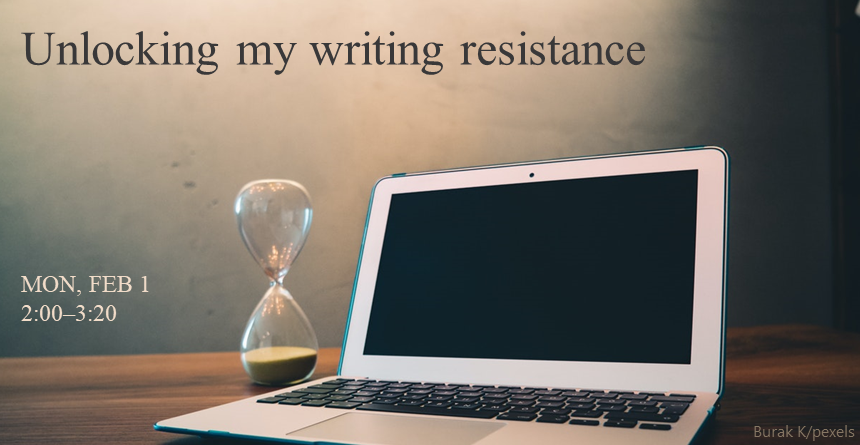
-
21WQ Unlocking my writing resistance - details
-
Afternoon workshop
Unlocking my writing resistance
Mon, Feb 1 | 2:00–3:20 | Zoom link provided upon registration
Facilitated by Holly Slay Ferraro
I never have had sustained time to write, long periods or a week away to do anything - I never had that. So I would always write under conditions that probably are unbearable when people think of how one writes.
–Toni Morrison
Many of us can see ourselves in Morrison's words - except we haven't found a way to be productive despite our condition. So, we say to ourselves (and anyone else who will listen):
- "I need at least a one-hour block to write."
- "I'll write during the summer break because it's impossible to write during the school year."
- "If only I could get away for a few days, I could finish this manuscript."
- "Nobody reads this stuff anyway!"
Like Morrison, most of us do not have sustained periods to write. The good news is that research shows we can make significant progress on our scholarship in as little as 15 minutes per day (Boice, 1997). And, scholarly writing can be quite influential (there are scholars from every discipline who appear in newspapers, on television, and on podcasts).
So, if time and the impact of scholarship aren't blocking our writing, what is? In this workshop, we will explore our writing resistance and create strategies for getting our writing on track.
» Registration is now closed.
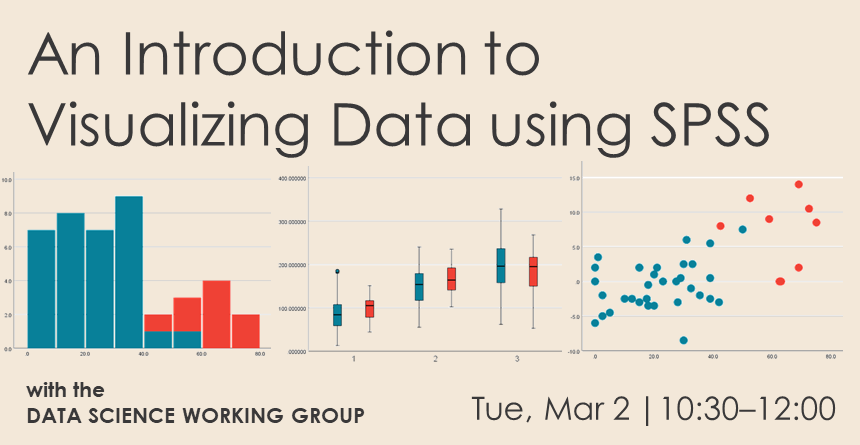
-
21WQ An introduction to visualizing data using SPSS - details
-
Morning workshop
An introduction to visualizing data using SPSS
Tue, Mar 2 | 10:30–12:00 | Zoom link provided upon registration
Hosted by the Data Science Working Group with support from the Center for Faculty Development and the Office of Sponsored Projects
Facilitated by Erica Rauff (Kinesiology), J. McLean Sloughter (Mathematics), and AJ Stewart (Mathematics)
Being able to create appropriate graphs is a key tool in data-informed research. Using the right graphs can allow you to quickly communicate interesting findings and can help you understand your data and formulate new research questions.
While many people have likely used Excel to graph their data, Excel has limited functionality for creating many standard data visualizations. SPSS is a statistical software package that has a spreadsheet interface very similar to Excel, but with far more options for data visualization and data analysis. It is available to all SU faculty, staff, and students through SU's virtual desktop (desktop.seattleu.edu).
In this workshop, we will discuss some underlying principles of what makes for good and useful data visualization. We will look at several standard types of graphs, and discuss how to decide which graphs are appropriate for a given set of data. We will also learn how to use SPSS to create these graphs.
This workshop will include demonstrations of graph creation as well as time for participants to try out SPSS for themselves. Example data sets will be provided, but if you have data from a project you're interested in working with, please bring that along and we can help you get started visualizing your data!
This will be an entry-level workshop. No prior experience in statistics or data visualization will be needed in order to participate.
» Registration is now closed
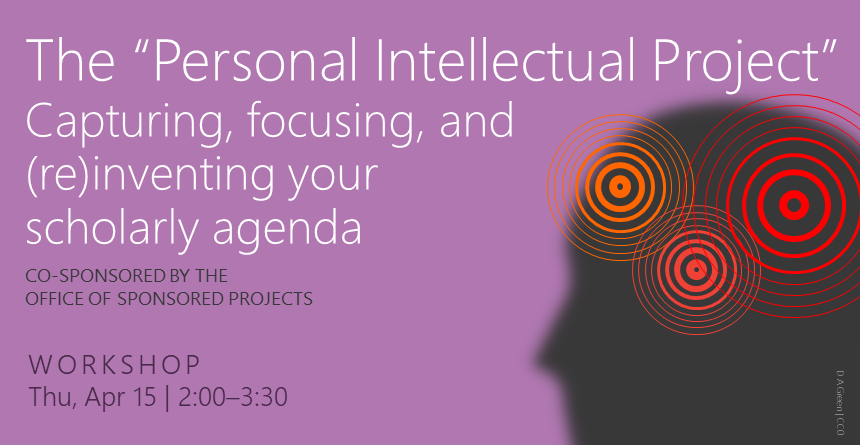
-
21SQ Personal Intellectual Project - details
-
Afternoon Workshop
The Personal Intellectual Project: Capturing, focusing, and (re)inventing your scholarly agenda
Thu, Apr 15 | 2:00–3:30 | Zoom link provided upon registration
Co-sponsored by the Office of Sponsored Projects (OSP)
Facilitated by David Green and Kara Luckey
Spring is often the time when faculty are preparing their files for promotion or tenure, or are reflecting on their work to date to help clarify their summer projects.
Yet depending on our career stage, our scholarly agenda can pose a variety of challenges. For many newer scholars, it can be hard to step back and identify exactly what we’re doing – and why it matters. For more seasoned researchers, in contrast, we often find our passions have shifted to new topics, or that we need to reinvent ourselves as scholars in somewhat different academic fields than where we began.
Difficulty in describing our research arc can affect our chances of winning grants, of being promoted, or simply of feeling in control of our own scholarship. It can lead us to take on projects that don’t exactly align with our expertise or intellectual curiosity, and to missing out on those that do.
In this session, we’ll provide a space for you to think through your own “Personal Intellectual Project”—the big-picture encapsulation of your different scholarly topics and agendas. For newer scholars, can you sense its form yet? Do you recognize the parameters you want to set to keep it manageable? For more experienced scholars, has your intellectual project evolved since you last considered it? What has changed and what remains the same? What projects might reignite your enthusiasm?
Through a structured process and through interdisciplinary small-group conversation over Zoom, you’ll be better placed to advocate for yourself and your scholarship and will have a clearer vision of viable and enticing scholarly topics for the future.
Be sure to have a copy of your up-to-date CV with you for the session.
» Registration is now closed.
Optional Follow-up Session
Attendees who would like to check back in on this topic can do so in a later discussion and debrief.
Thu, May 6 | 2:00–3:00 | Zoom
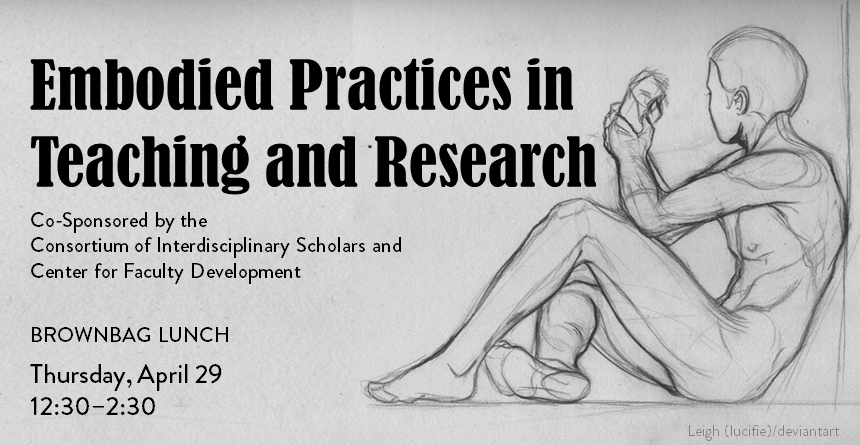
-
21SQ Embodied practices in teaching and research - details
-
Panel Discussion
Embodied practices in teaching and research
Thu, Apr 29 | 12:30–1:30 main event, with a follow-up discussion until 2:30 | Zoom link provided upon registration
Co-sponsored by the Consortium of Interdisciplinary Scholars (CIS)
Facilitated by Jen Schulz (Interdisciplinary Liberal Studies)
After a year of working in the oft-labeled "disembodied" Zoom space, many of us are recognizing how, faced with the lack of opportunities for interpersonal engagement as well as the fear of infection, we have become increasingly aware of our own embodiment. The ubiquitous threat that discriminatory practices, systems, and implicit bias poses to certain bodies over others has, again, been thrown into bold relief during this time.
Come listen to Jasmine Mahmoud (College of Arts and Sciences), Alic Shook (College of Nursing), and Dean Spade (School of Law) respond to the following question:
How do you attend to embodiment (conceptually and/or in practice) in your teaching and your research?
Following each talk, we will invite you into lively conversation and collaboration. Bring your lunch and stay, if you can, for the next hour.
» Registration is now closed.
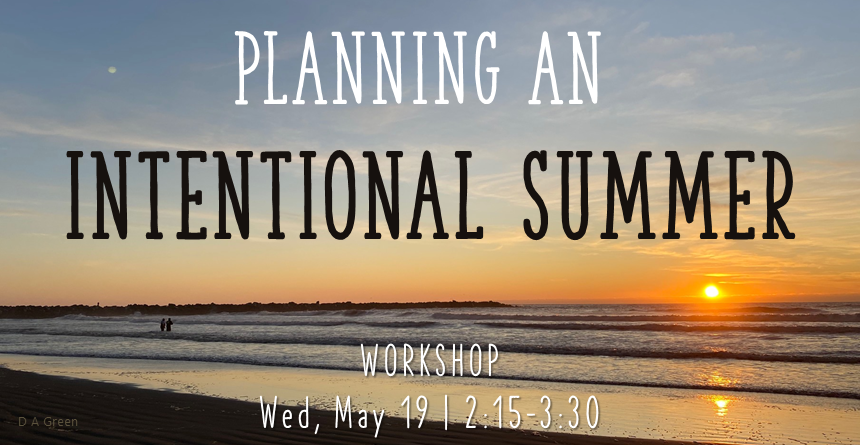
-
21SQ Planning an intentional summer - details
-
Afternoon Workshop
Planning an intentional summer
Wed, May 19 | 2:15–3:30 | Zoom link provided upon registration
Co-sponsored by the Office of Sponsored Projects (OSP)
Facilitated by Holly Slay Ferraro
We often look forward to summer as a time for rest, rejuvenation, deep thinking, and writing. But how many times have you started the Fall tired and disappointed that your summer wasn't what you hoped? This active workshop provides an opportunity to be intentional about your summer. For example, do you have personal goals you want to achieve such as more rest or time with family and friends? Perhaps you want to finish an article, book, or have extended time for reading and writing. This workshop encourages you to identify goals that are important to you and create strategies to have the summer you desire in an encouraging and supportive community. Join us to craft an intentional summer!
» Registration is now closed.
2019–20
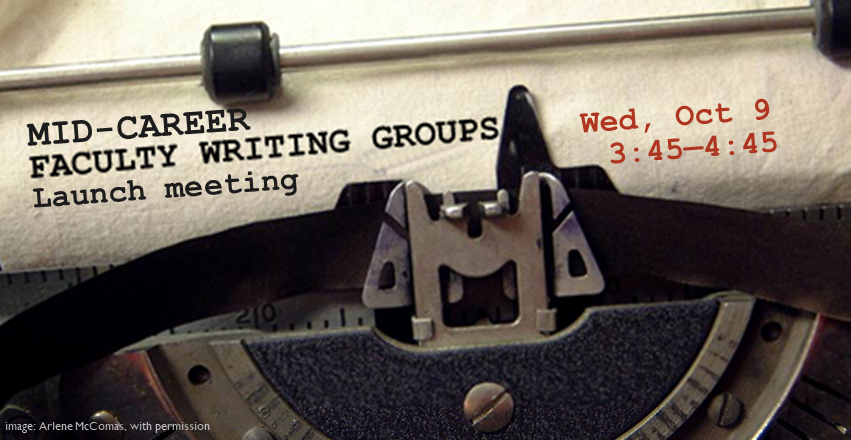
-
19FQ Mid-career Faculty Writing Groups - click for details
-
Launch Meeting
Wed, Oct 9 | 3:45–4:45pm | Casey 515 | Appetizers and wine provided
Co-sponsored by the Office of Sponsored Projects (OSP)
Facilitated by David Green (Faculty Development) and Jenna Isakson (Sponsored Projects)The “research on research” gives us good evidence on what helps faculty progress with their research, and in response, we’ve been launching Faculty Writing Groups since 2007. These groups provide you with camaraderie and accountability to achieve more in your scholarship. And they are intentionally interdisciplinary so that you remain the expert in your own field throughout.
This year, we are also organizing groups based on your career stage so that no one feels the need to mentor or to request mentoring within the group. This quarter’s launch is specifically for faculty who see themselves as mid-career.
(We’ll be setting up groups in Winter Quarter for early career faculty, and in Spring Quarter for senior faculty.)
By the end of this session, you will be grouped with two or three other colleagues from across campus and will be ready to meet with your group independently and regularly to help you achieve more in your research – and with less stress.
Full details on Faculty Writing Groups are on our website at: https://www.seattleu.edu/faculty-development/events/writing-groups/
»Registration is now closed.
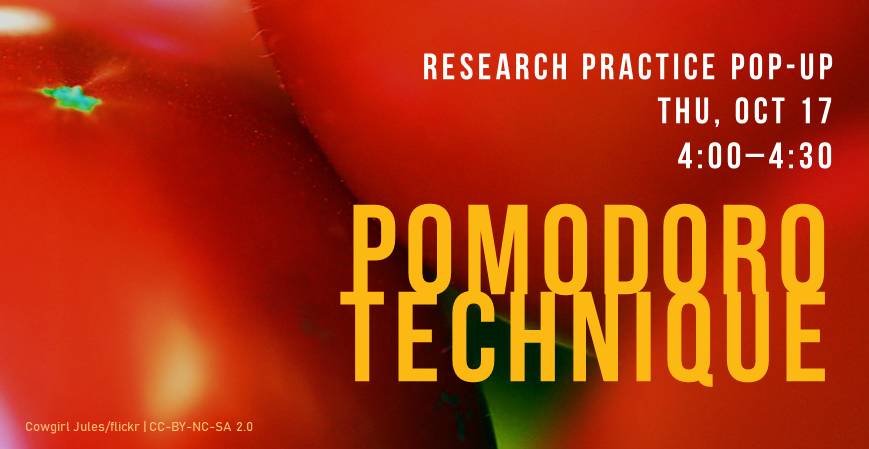
-
19FQ Pomodoro Technique - click for details
-
Research Pop-up
Thu, Oct 17 | 4:00–4:30 | HUNT 110 | Coffee and tea provided
Facilitated by Holly Slay Ferraro and David GreenIf you feel that you don’t have enough time to write, then you will want to attend our research pop-up on the “Pomodoro Technique” – a time-management method that allows you to make use of limited time rather than rail against it.
How can Pomodoro help you? First, it helps reduce distractions by focusing you on shorter periods of writing followed by breaks. Second, the goal-setting theory behind the Pomodoro Technique suggests that specific, measurable, and achievable goals motivate people and improve performance. Finally, the Pomodoro Technique can help you better understand how long things actually take. Do you need three hours to write an introduction or do you take three hours because you have allotted that much time? Hmm…
For answers to this question and more (such as why it is called Pomodoro), we’ll see you at the pop-up!
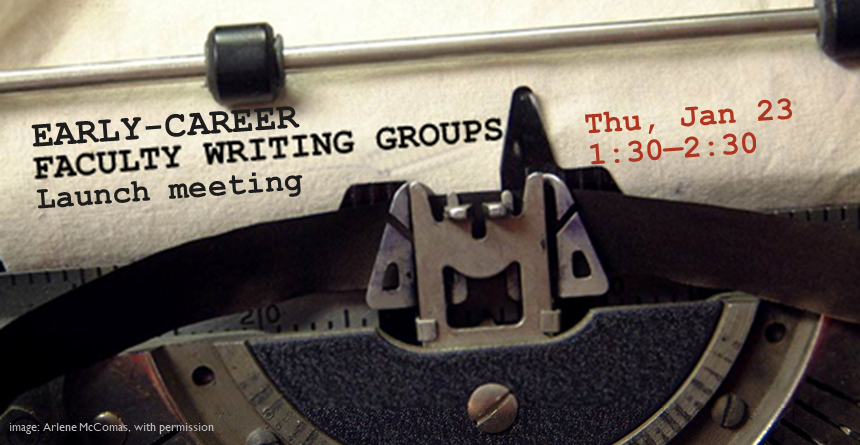
-
20WQ Early career Faculty Writing Groups - click for details
-
Launch Meeting
Co-sponsored by the Office of Sponsored Projects (OSP); facilitated by David Green and Jenna Isakson
Thu, Jan 23 | 1:30–2:30 | HUNT 100 | Coffee/tea provided
The “research on research” gives us good evidence on what helps faculty progress with their research, and in response, we’ve been launching Faculty Writing* Groups since 2007. [See below for our expansive definition of “writing.”] These groups provide you with camaraderie and accountability to achieve more in your scholarship. And they are intentionally interdisciplinary so that you remain the expert in your own field throughout.
This year, we are also organizing groups based on your career stage so that no one feels the need to mentor or to request mentoring within the group. This quarter’s launch is specifically for faculty who see themselves as being in the early career stage.
(We’ll be setting up groups in Spring Quarter for senior faculty.)
By the end of this session, you will be grouped with two or three other colleagues from across campus and will be ready to meet with your group independently and regularly to help you achieve more in your research – and with less stress.
Full details can be found by following this link to our webpage on Faculty Writing Groups.
»Registration is now closed
*"Writing:" When we say “writing,” we are using the definition from the National Center for Faculty Development and Diversity: “Writing” means absolutely everything you do to lead to a final scholarly product – with the exception of reading secondary literature. So “writing” in this sense includes, for instance, IRB applications, interviews, lab work, studio work, computations, coding, analytics – as well as the more traditional aspect of writing a final product for publication. This is an expansive interpretation that works across academic fields.
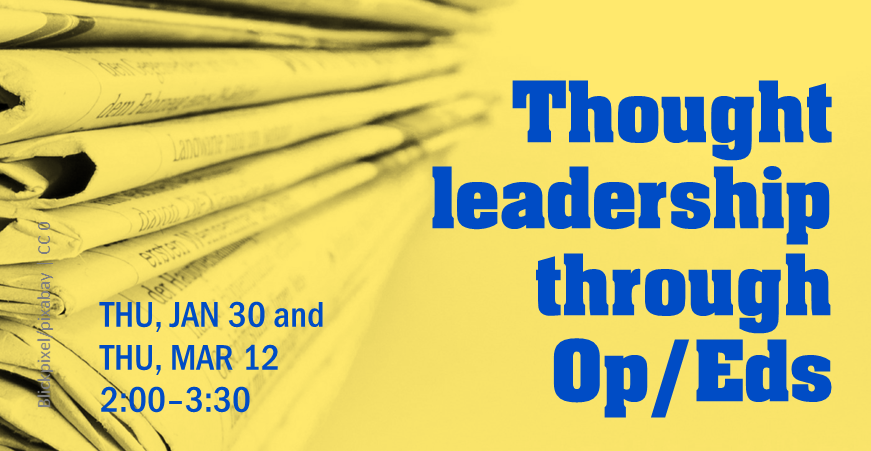
-
20WQ Thought leadership through Op/Eds - click for details
-
Two-Part Afternoon Workshop
Co-sponsored by the Office of Diversity and Inclusion (ODI); Facilitated by Holly Slay Ferraro
Thu, Jan 30 AND Mar 12 | 2:00–3:30 | CASY 525 | Coffee/tea provided
Does your scholarship have an impact beyond your disciplinary community? Would you like to make a difference in the world by engaging in public discourse? The purpose of this workshop is to provide you, as a faculty member, with the tools that enable you to have a greater influence outside of your academic camps.
Op/Eds are opinion essays appearing in newspapers or magazines written by non-journalists. Highly regarded academics frequently write them (think Paul Krugman), and, when done well, they engage people in critical examinations of events and issues. Op/Ed writers have the power to challenge and rewrite oppressive narratives, to give voice to the marginalized and offer solutions to some of the most vexing issues impacting institutions and communities.
In this series, we’ll develop a small cohort of academics committed to making an impact through thoughtful public scholarship. Our goal is drafting op/ed pieces and working with experienced colleagues to move essays toward publication. We designed this workshop to amplify the voices of any faculty member who wishes to impact our world through public scholarship regardless of race, age, gender, etc. At the same time, we encourage the participation of voices that are typically and historically underrepresented in the media.
»Applications are now closed.
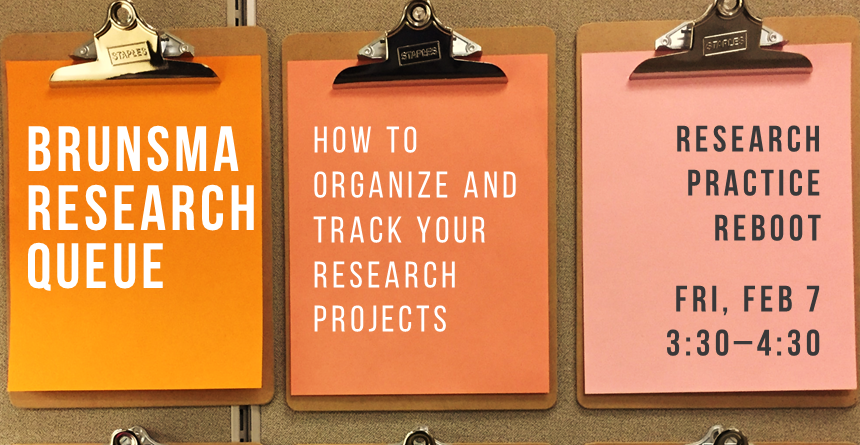
-
20WQ The Brunsma Research Queue - click for details
-
Research Practice Reboot
Facilitated by David Green and Holly Slay Ferraro
Fri, Feb 7 | 3:30–4:30 | HUNT 100 | Drinks and appetizers provided
Keeping on top of multiple research projects at different stages of development can be a challenge, especially when we’re doing so alongside a full teaching load and a raft of service commitments to the university, our own academic fields, and the community. So how do you maintain a bird’s-eye view of those projects in such a way that you keep to your planned timelines – and make those timelines manageable?
One method recommended by the National Center for Faculty Development and Diversity is the “Brunsma Research Queue” or BRQ – a practical, visual, and immediate means of keeping tabs on your progress and prioritizing your work.
In this one-hour session over drinks and appetizers, we’ll explore how to adapt the BRQ method to suit your own projects as well as how to replicate the BRQ in an electronic format.
Remember to bring along a list of your current scholarly projects so that you can try it out for yourself.
»Registration is now closed
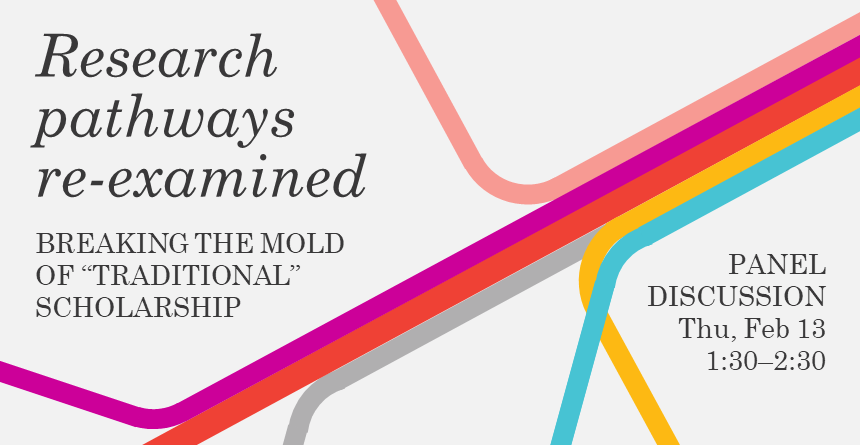
-
20WQ Research pathways re-examined - click for details
-
Panel Discussion
Co-sponsored by the Office of Diversity and Inclusion (ODI); Facilitated by Holly Slay Ferraro
Thu, Feb 13 | 1:30–2:30 | Rolfe Room (ADAL Building) | Coffee/tea provided
When I completed my doctorate, I thought I was a scholar. But it was only when I had the courage to deviate from a safe, mainstream approach to my scholarship that I actually found passion for where I could really make a difference.
Stella Nkomo, University of Pretoria
Doctoral education has many things to recommend it. We read extensively. We write exhaustively. And we are socialized – quite thoroughly. Many of us have pursued research agendas determined early in our careers by our dissertation chairs or the departments in which we studied. But are they right for us today? And are they right for the kind of Jesuit institution Seattle University seeks to be?
The university’s ADVANCE grant from the National Science Foundation has prompted rich discussion on the breadth of research we already undertake at Seattle U and on the types of research we currently value. Our institutional landscape is shifting, opening up broader possibilities than the “traditional” research format.
In this panel discussion, we’ll hear from scholars who have chosen a variety of paths. Some have decided to do traditional discipline-based scholarship, while others have focused on the scholarship of teaching and learning or community-based research and activism. Many have been successful in winning tenure, some have become full professors, and some are living their best lives as non-tenure track faculty. Come and hear their stories and re-examine your own!
»Registration is now closed.
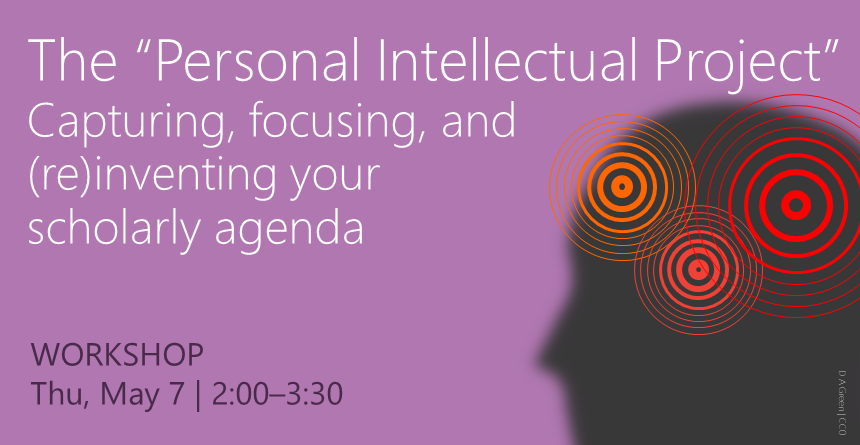
-
20SQ Personal Intellectual Project - details
-
Virtual workshop
Facilitated by David Green
Thu, May 7 | 2:00–3:30 | Zoom link will be sent upon registration
Spring is often the time when faculty are preparing their files for promotion or tenure, or are reflecting on their work to date to help clarify their summer projects.
Yet depending on our career stage, our scholarly agenda can pose a variety of challenges. For many newer scholars, it can be hard to step back and identify exactly what we’re doing – and why it matters. For more seasoned researchers, in contrast, we often find our passions have shifted to new topics, or that we need to reinvent ourselves as scholars in somewhat different academic fields than where we began.
Difficulty in describing our research arc can affect our chances of winning grants, of being promoted, or simply of feeling in control of our own scholarship. It can lead us to take on projects that don’t exactly align with our expertise or intellectual curiosity, and to missing out on those that do.
In this session, we’ll provide a space for you to think through your own “Personal Intellectual Project”—the big-picture encapsulation of your different scholarly topics and agendas. For newer scholars, can you sense its form yet? Do you recognize the parameters you want to set to keep it manageable? For more experienced scholars, has your intellectual project evolved since you last considered it? What has changed and what remains the same? What projects might reignite your enthusiasm?
Through a structured process and through interdisciplinary small-group conversation over Zoom, you’ll be better placed to advocate for yourself and your scholarship and will have a clearer vision of viable and enticing scholarly topics for the future.
Be sure to have a copy of your up-to-date CV with you for the session.
Optional Follow-up Session
Attendees who would like to check back in on this topic can do so in a later discussion and debrief.
Thu, May 21 | 2:00–3:00 | Zoom
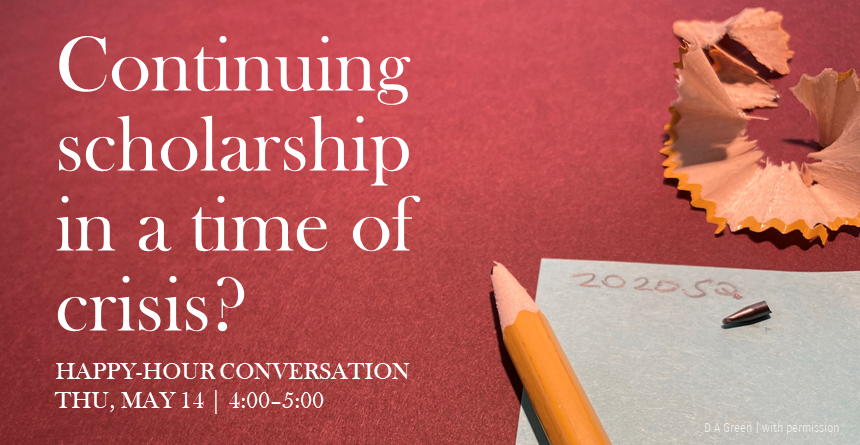
-
20SQ Continuing scholarship in a time of crisis - details
-
Happy-Hour Conversation
Co-sponsored by the Office of Sponsored Projects and the Center for Faculty Development; facilitated by Holly Slay Ferraro, David Green, and Jenna Isakson
Thu, May 14 | 4:00–5:00 | Zoom link will be sent upon registration
What happens to our scholarly and creative efforts when our lives have been significantly disrupted?
Clearly there is no single “right” answer to this question: individual contexts require individualized strategies and orientations to help us find our own balance in an unbalanced world.
Perhaps for you, scholarship pales into insignificance compared to supporting your students, caring for relatives and for yourself, and/or home-schooling your children; it’s a luxury you need to let go of. Or maybe time spent on scholarship provides you a welcome reprieve from email, social media, and the news – a chance to get comfortably lost in ideas and projects. Alternatively, you may be someone for whom scholarship is a form of healing, enabling you to think and write your way through the present trauma to new realizations and a deeper appreciation of what matters to you most.
Whatever your stance – and whatever your discipline, career stage, rank, or research funding – we invite you to join us for this happy-hour conversation to share and explore the myriad approaches to scholarship that are enabling you to stay grounded in the age of COVID-19.
In addition to creating a space for you to share with colleagues, staff from the Office of Sponsored Projects and Center for Faculty Development will be on hand to reflect on “nuts-and-bolts” approaches to addressing the challenges associated with timelines and/or research funding when so many factors are beyond our collective control.
Outside the session, we’ll share a few resources that provide contrasting perspectives on scholarly productivity in a time of crisis as well as resources for managing a sponsored project through this new environment.
Remember to bring your own beverages and snacks!
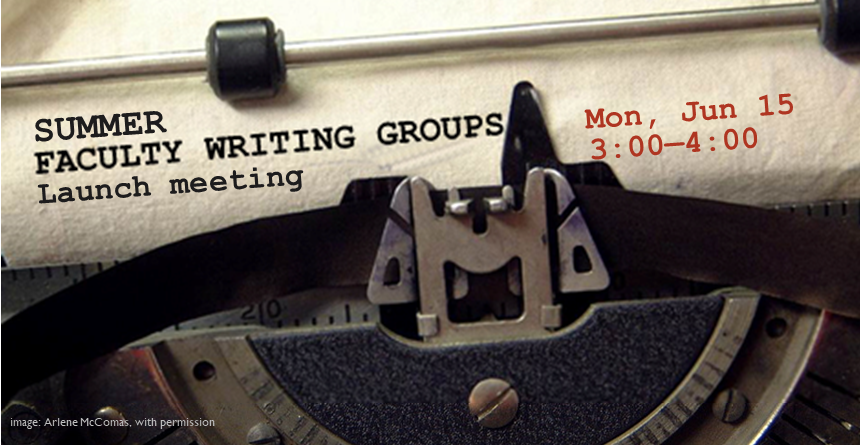
-
20SQ Summer Faculty Writing Groups - details
-
Launch meeting
Co-sponsored with the Office of Sponsored Projects; Facilitated by David Green and Jenna Isakson
Mon, Jun 15 | 3:00–4:00 | Zoom link will be sent upon registration
In sessions during Spring Quarter, we heard that many faculty had decided to shelve their scholarship and research until the summer so they could focus their energies on pivoting their classes to a remote format and supporting their students.
We also know from the research that a combination of camaraderie and accountability help faculty move their scholarship forward – at whatever pace suits them. As a result, we’ve been launching Faculty Writing* Groups since 2007 (see below for our expansive definition of “writing”), and this year, we are unusually launching summer groups to provide you additional summer support if it would help you. These groups are intentionally interdisciplinary so that you remain the expert in your own field throughout; you set your own goals for your own individual scholarship, with encouragement from your group members.
By the end of this session, you will be grouped with two or three other colleagues from across campus and will be ready to meet with your group independently and regularly to help you achieve more in your research and scholarship – and with less stress.
Full details about the model can be found by following this link to our webpage on Faculty Writing Groups.
*“Writing:” When we say “writing,” we are using the definition from the National Center for Faculty Development and Diversity: “Writing” means absolutely everything you do to lead to a final scholarly product – with the exception of reading secondary literature. So “writing” in this sense includes, for instance, IRB applications, interviews, lab work, studio work, computations, coding, analytics – as well as the more traditional aspect of writing a final product for publication. This is an expansive interpretation that works across academic fields.
» Register
2018–19
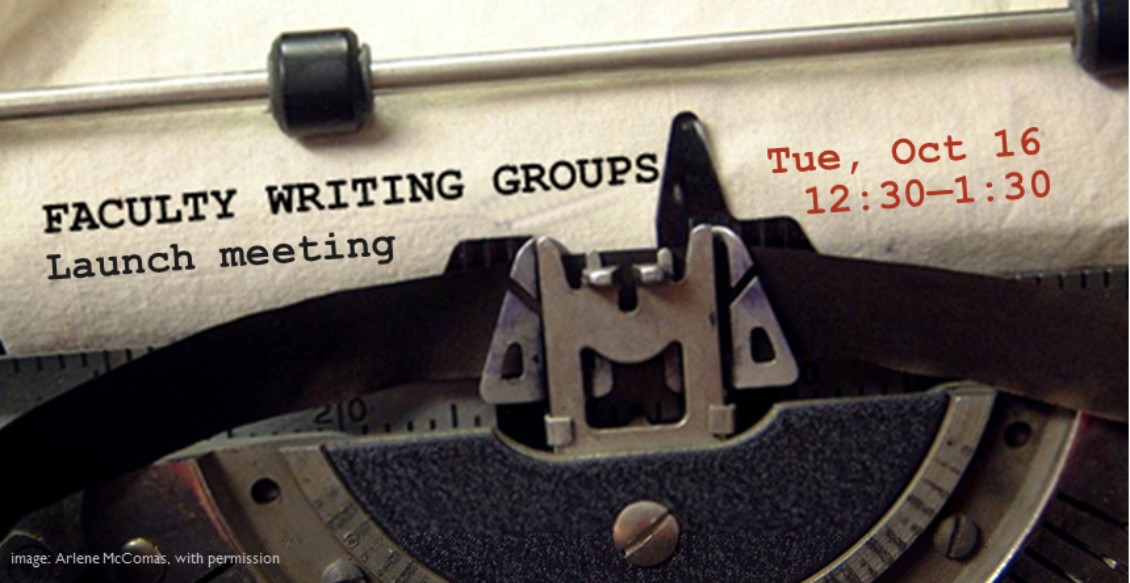
-
18FQ Faculty Writing Groups - details
-
Faculty Writing Groups
LUNCHTIME LAUNCH MEETING
Tue, Oct 16 | 12:30–1:30pm | Change of venue: Please contact David Green directly if you'd like to attend (greend@seattleu.edu)
Co-sponsored by the Office of Sponsored Projects (OSP); facilitated by David Green and Sarah BricknellThe “research on research” gives us good evidence on what helps faculty progress with their research, and in response, we’ve been launching Faculty Writing Groups since 2007. These groups provide you with camaraderie and accountability to achieve more in your scholarship. And they are intentionally interdisciplinary so that you remain the expert in your own field throughout. We also aim to group you with peers at a similar career stage so that no one feels the need to mentor or to request mentoring within the group.
By the end of this session, you will be grouped with two or three other colleagues from across campus and will be ready to meet with your group independently and regularly to help you achieve more in your research – and with less stress.
Click here for our webpage with full details on Faculty Writing Groups.
» Registration is now closed.
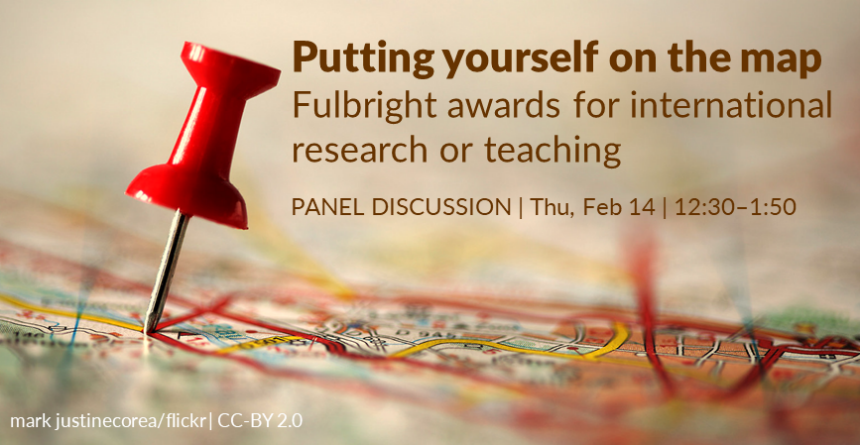
-
19WQ Fulbright - Putting yourself on the map - details
-
Lunchtime Panel Discussion
Putting yourself on the map: Fulbright awards for international research or teaching
Thu, Feb 14 | 12:30-1:50 | CHDN 145 | Lunch provided
Facilitated by Jacquelyn MillerIf you are interested in international research and/or teaching opportunities, a Fulbright award is a good way to fund your academic work. At this event, a panel of recent Fulbright award recipients will share their motives for applying for a Fulbright, insights into the application process, and tips on how to gain the most from your experience as a Fulbright ambassador as well as addressing questions from the audience.
If you are interested in learning more about the Fulbright Scholar Program, contact Jacquelyn Miller (University Liaison to the Fulbright Scholar Program).
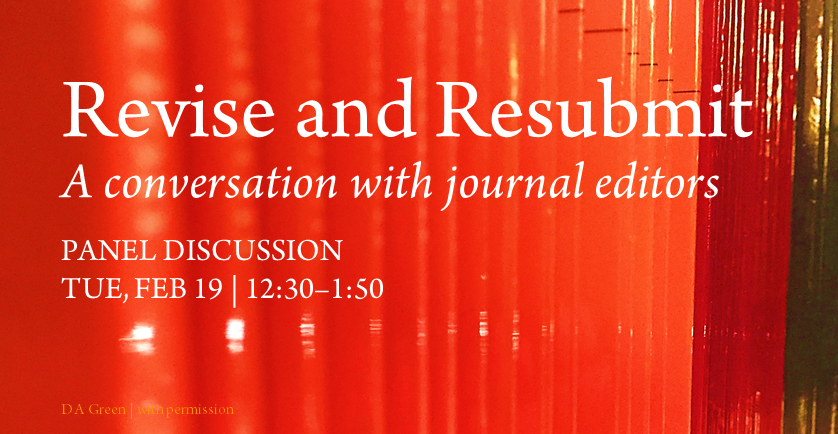
-
19WQ Revise and Resubmit - details
-
Revise and resubmit: A conversation with journal editors
LUNCHTIME PANEL DISCUSSION
Tue, Feb 19 | 12:30–1:50 | Casey Commons (CASY 530) | Lunch provided
Facilitated by David GreenIn many of our disciplines, publishing in scholarly journals is the coin of the realm. Many SU faculty are also deeply invested not only in publishing, but also in reviewing for journals—that hidden and significant contribution to the advancement of their disciplines.
Yet even with this level of professional engagement, what happens behind the scenes in academic journals is often unclear. In the Center for Faculty Development, we regularly have conversations with colleagues wondering how best to communicate with an editor, how to respond to reviewers’ comments, and how faculty can put themselves in the editors’ shoes so that they can be low-maintenance and high-value authors and colleagues.
In this panel discussion, you’ll be able to raise your own questions with journal editors from a range of disciplines here at Seattle University. You’ll hear how different journals handle tricky situations, which parts of the process most matter to the editors, and how you can enhance your reputation across your own disciplinary community.
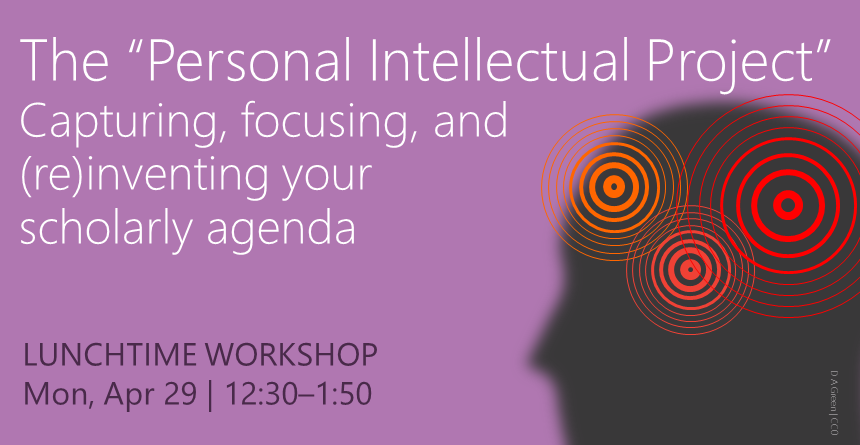
-
19SQ The personal intellectual project - details
-
The “Personal Intellectual Project:” Capturing, focusing, and (re)inventing your scholarly agenda
LUNCHTIME WORKSHOP
Mon, Apr 29 | 12:30–1:50 | HUNT 100 | Lunch provided
Facilitated by David GreenDepending on our career stage, our scholarly agenda can pose a variety of challenges. For many newer scholars, it can be hard to step back and identify exactly what it is we’re doing – and why it matters. For more seasoned researchers, in contrast, we often find our passions have shifted to new topics, or that we need to reinvent ourselves as scholars in somewhat different academic fields than where we began.
Difficulty in describing our research arc can affect our chances of winning grants, of being promoted, or simply of feeling in control of our own scholarship. It can lead us to take on projects that don’t exactly align with our expertise or intellectual curiosity, and to missing out on those that do.
In this session, we’ll provide a space for you to think through your own “Personal Intellectual Project”—the big-picture encapsulation of your different scholarly topics and agendas. For newer scholars, can you sense its form yet? Do you recognize the parameters you want to set to keep it manageable? For more experienced scholars, has your intellectual project evolved since you last considered it? What has changed and what remains the same? What projects might reignite your enthusiasm?
2017–18
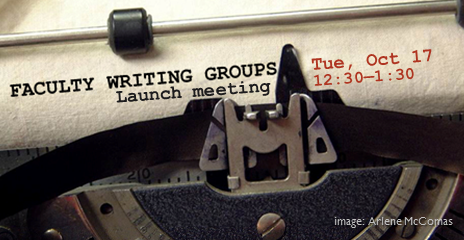
-
17FQ Faculty Writing Groups - details
-
Faculty Writing Groups
LAUNCH MEETING
Tue, Oct 17 | 12:30-1:30 | Chardin 142 | Lunch provided
Co-sponsored by the Office of Sponsored Projects (OSP)The “research on research” gives us good evidence on what helps faculty progress with their research, and in response, we’ve been launching Faculty Writing Groups since 2007. These groups provide you with camaraderie and accountability to achieve more in your scholarship. And they are intentionally interdisciplinary so that you remain the expert in your own field throughout.
By the end of this session, you will be grouped with two or three other colleagues from across campus and will be ready to meet with your group independently and regularly to help you achieve more in your research – and with less stress.
»Registration is now closed.
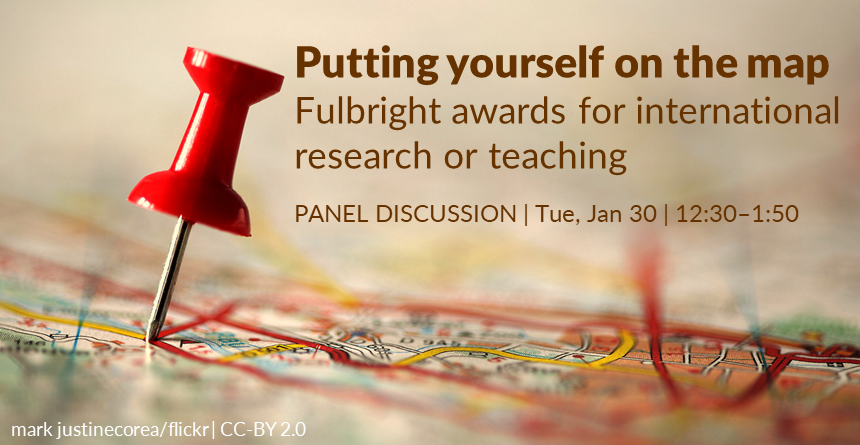
-
18WQ Putting yourself on the map: Fulbright panel - details
-
Panel Discussion
Putting Yourself on the Map: Fulbright Awards for International Research or Teaching
Tue, Jan 30 | 12:30-1:50 | HUNT 100 | Lunch provided
Facilitated by Jacquelyn MillerIf you are interested in international research and/or teaching opportunities, a Fulbright award is a good way to fund your academic work. At this event, a panel of recent Fulbright award recipients will share their motives for applying for a Fulbright, insights into the application process, and tips on how to gain the most from your experience as a Fulbright ambassador as well as addressing questions from the audience.
If you are interested in learning more about the Fulbright Scholar Program, contact Jacquelyn Miller (University Liaison to the Fulbright Scholar Program).
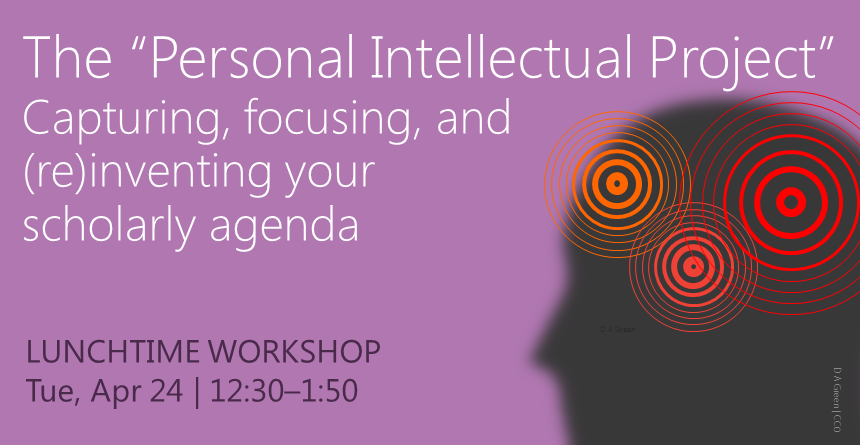
-
18SQ The personal intellectual project - details
-
The “Personal Intellectual Project:” Capturing, focusing, and (re)inventing your scholarly agenda
LUNCHTIME WORKSHOP
Tue, Apr 24 | 12:30–1:50 | Pigott 306 | Lunch provided
Facilitated by David GreenDepending on our career stage, our scholarly agenda can pose a variety of challenges. For many newer scholars, it can be hard to step back and identify exactly what it is we’re doing – and why it matters. For more seasoned researchers, in contrast, we often find our passions have shifted to new topics, or that we need to reinvent ourselves as scholars in somewhat different academic fields than where we began.
Difficulty in describing our research arc can affect our chances of winning grants, of being promoted, or simply of feeling in control of our own scholarship. It can lead us to take on projects that don’t exactly align with our expertise or intellectual curiosity, and to missing out on those that do.
In this session, we’ll provide a space for you to think through your own “Personal Intellectual Project”—the big-picture encapsulation of your different scholarly topics and agendas. For newer scholars, can you sense its form yet? Do you recognize the parameters you want to set to keep it manageable? For more experienced scholars, has your intellectual project evolved since you last considered it? What has changed and what remains the same? What projects might reignite your enthusiasm?
2016-17
Spring 2017
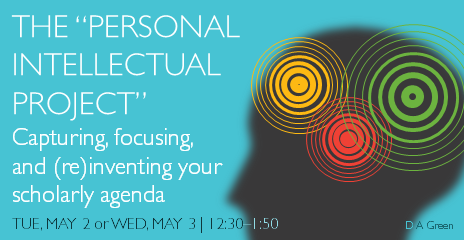
The “Personal Intellectual Project:” Capturing, focusing, and (re)inventing your scholarly agenda
LUNCHTIME WORKSHOP
Tuesday, May 2 | 12:30–1:50 | Casey Commons | Lunch provided
OR
Wed, May 3 | 12:30–1:50 | Casey Commons | Lunch provided
Facilitated by David Green
Depending on our career stage, our scholarly agenda can pose a variety of challenges. For many newer scholars, it can be hard to step back and identify exactly what it is we’re doing – and why it matters. For more seasoned researchers, in contrast, we often find our passions have shifted to new topics, or that we need to reinvent ourselves as scholars in somewhat different academic fields than where we began.
Difficulty in describing our research arc can affect our chances of winning grants, of being promoted, or simply of feeling in control of our own scholarship. It can lead us to take on projects that don’t exactly align with our expertise or intellectual curiosity, and to missing out on those that do.
In this session, we’ll provide a space for you to think through your own “Personal Intellectual Project”—the big-picture encapsulation of your different scholarly topics and agendas. For newer scholars, can you sense its form yet? Do you recognize the parameters you want to set to keep it manageable? For more experienced scholars, has your intellectual project evolved since you last considered it? What has changed and what remains the same? What projects might reignite your enthusiasm?
Fall 2016
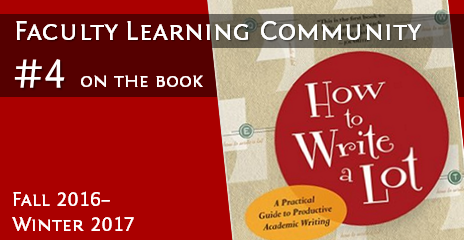
How to write a lot: A practical guide to productive academic writing
FACULTY LEARNING COMMUNITY
16FQ-17WQ
For some of us, building and maintaining research momentum during the academic year presents challenges. For others, returning to a stalled research project that has been languishing in a folder for months poses a different sort of psychological hurdle. For others still, a productive scholarly life comes at the expense of evenings, weekends, and vacation.
For each of these situations, Paul Silvia offers an array of strategies and tactics to help us be more productive in our research – and to do so without impeding our quality of life. Drawing examples from his own field of psychology, Silvia shows not only how we can overcome our writing roadblocks, but also provides detailed advice on how to write and revise articles, improve writing quality, and succeed in academic publishing.
In this four-session Faculty Learning Community over fall and winter, facilitated by Allison Henrich (Mathematics), we will progress through the chapters of this short and lighthearted book, try out different ideas in our own research practice, and explore the extent to which the author’s suggestions fit our own individual contexts.
Over the four sessions, this book and our discussions will help you:
- Identify any barriers that are holding you back in your research
- Experiment with new research and writing strategies
- Share triumphs and trials as you seek to find approaches that will work for you.
This community is for any faculty members who wish to boost their writing productivity without sacrificing evenings, weekends, and vacations.
Request a consultation on this topic.
Check out this book from the Center library.
Find out more about "faculty learning communities" and see the Center's current FLC options.
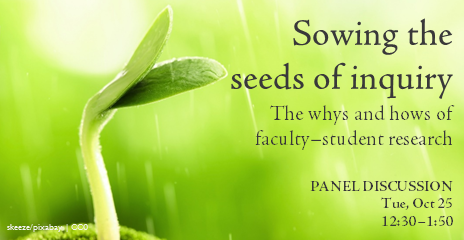
Sowing the seeds of inquiry: The whys and hows of faculty–student research
PANEL DISCUSSION
Tue, Oct 25 | 12:30–1:50 | Student Center 130 | Lunch provided
Facilitated by David Green
Co-sponsored by ORSSP and SUURA
Have you considered involving students as research partners, but are not sure how to achieve the best results? Or, are you curious about the benefits of faculty-student research for both you and your students?
Working on a research project with a faculty member has been found to be a “high-impact educational practice” (Kuh, 2008) for students, accelerating the development of important critical thinking and practical disciplinary research skills. Involving students in your research can also impact a faculty member’s research agenda in new and exciting ways as well increasing your productivity level by having a built-in accountability partner and someone with whom to share the workload.
While faculty–student research has been more prominent in the sciences, other disciplines across campus have also developed ways to work with students that ensure a best practices approach. So how do these practices look and what can we learn from our colleagues who are already engaged in this work?
In this panel discussion with SU faculty from a variety of fields, you’ll have opportunity to learn how you can nurture the skills of inquiry by creating joint faculty–student research projects of your own.
Request a consultation on this topic.
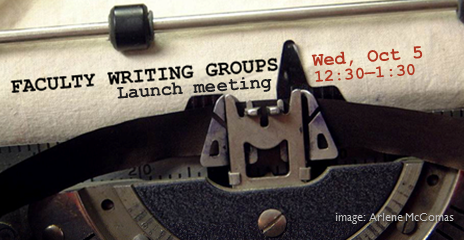
Faculty Writing Groups
LAUNCH MEETING
Wed, Oct 5 | 12:30-1:30 | Student Center 130 | Lunch provided
Co-sponsored by ORSSP
The “research on research” gives us good evidence on what helps faculty progress with their research, and in response, we’ve been launching Faculty Writing Groups since 2007. These groups provide you with camaraderie and accountability to achieve more in your scholarship. And they are intentionally interdisciplinary so that you remain the expert in your own field throughout.
By the end of this session, you will be grouped with two or three other colleagues from across campus and will be ready to meet with your group independently and regularly to help you achieve more in your research – and with less stress.
Find out more about faculty writing groups and see the Center's current offering.
Put your name on a waiting list to join a faculty writing group.
2015-16
Spring 2016
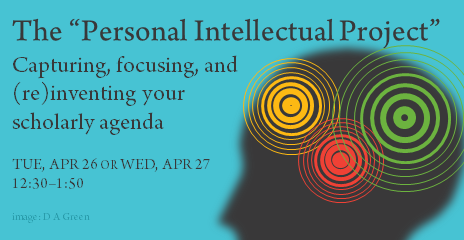
The personal intellectual project: Capturing, focusing, and (re)inventing your scholarly agenda
LUNCHTIME WORKSHOP
Tue, Apr 26 | 12:30–1:50 | Casey Commons | Lunch provided
OR
Wed, Apr 27 | 12:30–1:50 | Casey Commons | Lunch provided
Facilitated by David Green
Depending on our career stage, our scholarly agenda can pose a variety of challenges. For many newer scholars, it can be hard to step back and identify exactly what it is we’re doing – and why it matters. For more seasoned researchers, in contrast, we often find our passions have shifted to new topics, or that we need to reinvent ourselves as scholars in somewhat different academic fields than where we began.
Difficulty in describing our research arc can affect our chances of winning grants, of being promoted, or simply of feeling in control of our own scholarship. It can lead us to take on projects that don’t exactly align with our expertise or intellectual curiosity, and to missing out on those that do.
In this session, we’ll provide a space for you to think through your own “Personal Intellectual Project”—the big-picture encapsulation of your different scholarly topics and agendas. For newer scholars, can you sense its form yet? Do you recognize the parameters you want to set to keep it manageable? For more experienced scholars, has your intellectual project evolved since you last considered it? What has changed and what remains the same? What projects might reignite your enthusiasm?
Request a consultation on this topic.
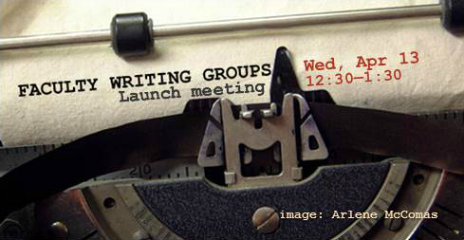
Faculty Writing Groups
LAUNCH MEETING
Wed, Apr 13 | 12:30-1:30 | Casey Commons | Lunch provided
Co-sponsored by ORSSP
The “research on research” gives us good evidence on what helps faculty progress with their research, and in response, we’ve been launching Faculty Writing Groups since 2007. These groups provide you with camaraderie and accountability to achieve more in your scholarship. And they are intentionally interdisciplinary so that you remain the expert in your own field throughout.
By the end of this session, you will be grouped with two or three other colleagues from across campus and will be ready to meet with your group independently and regularly to help you achieve more in your research – and with less stress.
Find out more about faculty writing groups and see the Center's current offering.
Put your name on a waiting list to join a faculty writing group.
Winter 2016
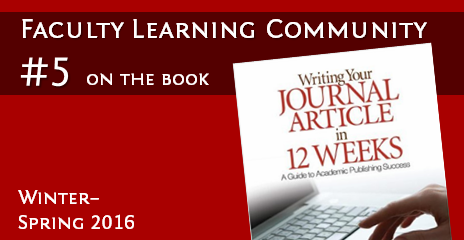
Writing your journal article in twelve weeks: A guide to academic publishing success
FACULTY LEARNING COMMUNITY
16WQ-16SQ
Do you have a manuscript that is waiting to be revised into an article for academic publication? Perhaps one where you just need a little more structure and nudging to refine and complete it?
If so, then Wendy Belcher’s Writing Your Journal Article in 12 Weeks is designed for you. It draws on research on such topics as faculty productivity, peer review, and common writing triumphs and failures, as well as on the author’s own experience as a journal editor and award-winning author herself. In the book, Belcher presents a carefully structured process to help you revise your manuscript and produce that final paper ready for submission in just twelve weeks.
In this four-session Faculty Learning Community over winter and spring, we will progress through the chapters of the book, meeting specific weekly writing goals in between, and producing a final manuscript ready for submission to an academic journal.
Over the four sessions, this book and our discussions will help you:
- Demystify the peculiarities of the academic publishing process
- Target the biggest writing challenges that faculty face
- Proceed step by manageable step with your own writing project
- Get published
This community is for any faculty member who is ready to REVISE a manuscript—whether a conference paper, unpublished article, chapter, or thesis—so that they can submit it to a suitable academic journal at the end of the 12 weeks. It is particularly suited to those in the humanities and social sciences.
Request a consultation on this topic.
Borrow this book from the Center's Library.
Fall 2015
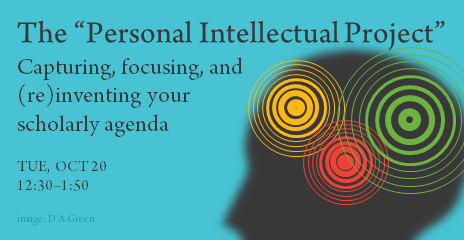
The "Personal Intellectual Project:" Capturing, focusing, and (re)inventing your scholarly agenda
LUNCHTIME WORKSHOP
October 20, 2015
Facilitated by David Green
Depending on our career stage, our scholarly agenda can pose a variety of challenges. For many newer scholars, it can be hard to step back and identify exactly what it is we’re doing – and why it matters. For more seasoned researchers, in contrast, we often find our passions have shifted to new topics, or that we need to reinvent ourselves as scholars in somewhat different academic fields than where we began.
Difficulty in describing our research arc can affect our chances of winning grants, of being promoted, or simply of feeling in control of our own scholarship. It can lead us to take on projects that don’t exactly align with our expertise or intellectual curiosity, and to missing out on those that do.
In this session, we’ll provide a space for you to think through your own “Personal Intellectual Project”—the big-picture encapsulation of your different scholarly topics and agendas. For newer scholars, can you sense its form yet? Do you recognize the parameters you want to set to keep it manageable? For more experienced scholars, has your intellectual project evolved since you last considered it? What has changed and what remains the same? What projects might reignite your enthusiasm?
Through a structured process and through interdisciplinary conversation, you’ll be better placed to advocate for yourself and your scholarship and will have a clearer vision of viable and enticing scholarly topics for the future.
Request a consultation on this topic.
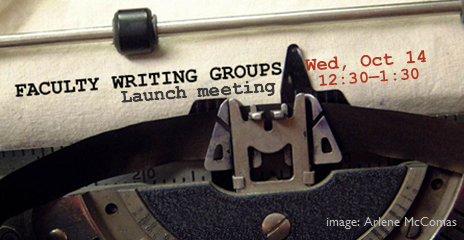
Faculty Writing Groups
LAUNCH MEETING
October 14, 2015
The “research on research” gives us good evidence on what helps faculty progress with their research, and in response, we’ve been launching Faculty Writing Groups since 2007. These groups provide you with camaraderie and accountability to achieve more in your scholarship. And they are intentionally interdisciplinary so that you remain the expert in your own field throughout.
By the end of this session, you will be grouped with two or three other colleagues from across campus and will be ready to meet with your group independently and regularly to help you achieve more in your research – and with less stress.
Find out more about faculty writing groups and see the Center's current offering.
Put your name on a waiting list to join a faculty writing group.
2014-15
Spring 2015
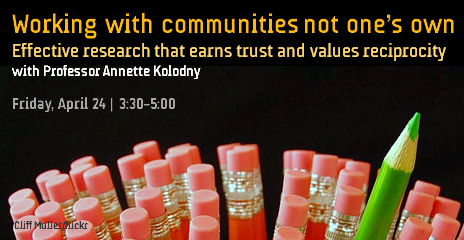
Working with communities not one's own: Effective research that earns trust and values reciprocity
GUEST SPEAKER DISCUSSION SESSION
April 23, 2015
Presenter: Professor Emerita Annette Kolodny, University of Arizona
Co-sponsored by Dr. Christina Roberts, Program Director for Indigenous Initiatives at SU
How can we research communities to which we do not belong – and do so in affirming and respectful ways? As more faculty across campus engage in community-based research (and teaching) in a variety of settings, this question is becoming more pressing than ever.
Community-based participatory research (CBPR) runs risks: An outside researcher may inadvertently be insensitive to the group’s cultural expectations or may take a condescending colonialist tone; at the opposite extreme, the researcher may be so enthused with the community as to lose nuance and perspective in the research. The cultural quagmire of CBPR is expansive.
Fortunately, though, we have models on which to draw.
Join Annette Kolodny—Professor Emerita from the University of Arizona and author of In Search of First Contact: The Vikings of Vinland, the Peoples of the Dawnland, and Anglo-American Anxiety of Discovery (2012)—as she talks about working with communities not her own and draws on her collaborative work with Mi’kmaq, Passamaquoddy, and Penobscot communities. Hearing and discussing Annette’s CBPR experiences will leave you feeling better informed about constructive, edifying, AND nuanced ways to work with communities not your own.
Request a consultation on this topic.
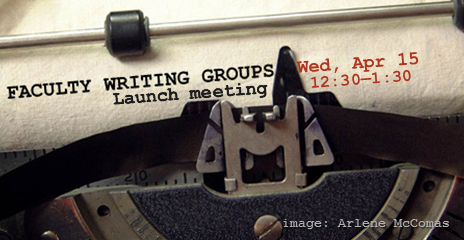
Faculty Writing Groups
LAUNCH MEETING
April 15, 2015
The “research on research” gives us good evidence on what helps faculty progress with their research, and in response, we’ve been launching Faculty Writing Groups since 2007. These groups provide you with camaraderie and accountability to achieve more in your scholarship. And they are intentionally interdisciplinary so that you remain the expert in your own field throughout.
By the end of this session, you will be grouped with two or three other colleagues from across campus and will be ready to meet with your group independently and regularly to help you achieve more in your research – and with less stress.
Find out more about faculty writing groups and see the Center's current offering.
Put your name on a waiting list to join a faculty writing group.
Winter 2015
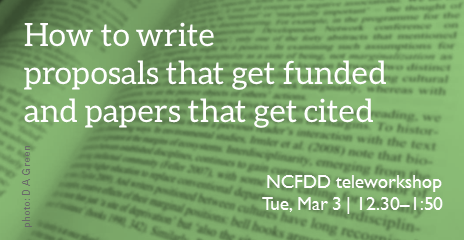
How to write proposals that get funded and papers that get cited
HOSTED NCFDD TELE-WORKSHOP
March 3, 2015
NCFDD presenter: Joshua Schimel | SU Hosts: David Green and Jacquelyn Miller
Please note: This event is a presented by the National Center for Faculty Development and Diversity (NCFDD). This tele-workshop is accessible on the NCFDD website, under Member Resources. The Center for Faculty Development funds an institutional membership to NCFDD for all SU faculty, graduate students and law students. Click here to find out more about Seattle University's institutional membership to NCFDD, including how to become a member of NCFDD.
Communicating in science is not just to tell us what you did and found, but to use that information to create new understanding—to tell a story about nature works. Writing science is about distilling the key messages and giving them to your readers so that the critical pieces are in the right places and are clear and compelling. In this workshop we will discuss how we adapt different “story structures” to different types of science writing—for example why the essence of a paper is the conclusions and so uses a structure that builds to the conclusions, while the essence of a proposal is the questions and so “if you haven’t told them in first two pages, you haven’t told them." We will work though examples illustrating how to frame the key pieces of a story: the opening, challenge, action, and resolution. I use concepts on writing and on being a writer from the best writers on writing, but adapt them to the unique challenges we face as working scientists trying to get our messages across in a world that is saturated with publications—how to write proposals that get funded and papers that get cited.
Request a consultation on this topic.
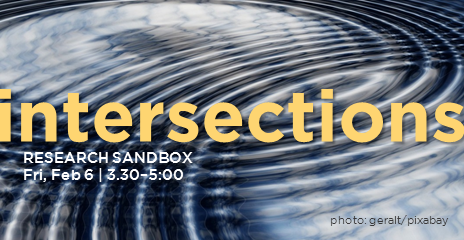
Intersections
RESEARCH SANDBOX
February 6, 2015
“Research sandboxes” are a chance for us as faculty to meet over drinks and appetizers to think creatively about our scholarship on a variety of topics that cross disciplinary boundaries. Our focus for this session is “intersectionality” – that complex interaction of cultural, social, and biological categories that can lead to very different experiences of privilege, discrimination, and stereotyping, and that can be applied in many fields of study. Two specific examples of intersectional research to be shared at this event are:
- How do age and race impact career success? Studies have found (a) that minority executives ascended the corporate ladder later than their white counterparts, and (b) that in some industries, age is stereotyped such that older workers are less desirable, regardless of race. Few researchers have examined leadership opportunities and work experience at the intersection of race and age. Holly Ferraro (Management, Albers) sets out to do so.
- Seattle is a dynamic city that is lauded for its progressive politics and environmentally oriented population. However, these progressive politics also contribute to gentrification and marginalize and/or pathologize communities that are rendered abject. In 2010, Krista Comer, scholar of the American West, expressed that critical regionalism offers literary scholars an opportunity to consider contact zones and to theorize "the intersections of cultural imaginaries, everyday life, and structures of place-d feeling." Christina Roberts (English, Arts & Sciences) is building upon these ideas in her intersectional analysis of our shared city.
Whether intersectionality is a key theme of your own research, a new area you’re developing, or simply one you’d like to learn about and experiment with in conversation, please join us for a convivial and thought-provoking gathering.
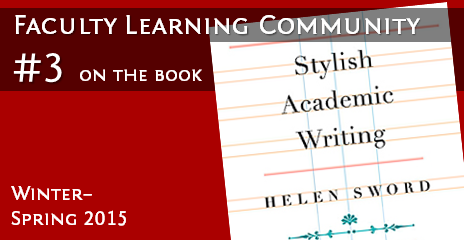
Stylish Academic Writing
FACULTY LEARNING COMMUNITY
14WQ-15SQ
Why is it that some academic writing appears to sparkle, while other texts feel flat and dull? What stylistic strategies do the most acclaimed academics use in their writing to present elegant ideas and data in elegant language? In Stylish Academic Writing (Harvard UP, 2012), Helen Sword shares key strategies and approaches that can breathe life into our academic work, recapturing through language the excitement we felt when we first developed our ideas. Based on her study of 1,000 academic articles, she provides examples from some of the best writers in the natural sciences, social sciences, and humanities for us to emulate in our own writing, along with clear guidance on how to get there.
In this four-session Faculty Learning Community over winter and spring, we will progress through the chapters and will craft and revise our own writing following Sword’s recommendations. We’ll discuss the stylistic habits – both good and bad – that we identify in our writing along the way, as well as strategies for strengthening the good and eliminating the bad.
This community is for any faculty member who is working on academic writing for publication. You may be working on a new paper from scratch, or rewriting a dissertation into something more digestible, or revising a manuscript that you know you could improve.
Request a consultation on this topic.
Borrow this book from the Center's Library.
.
Fall 2014
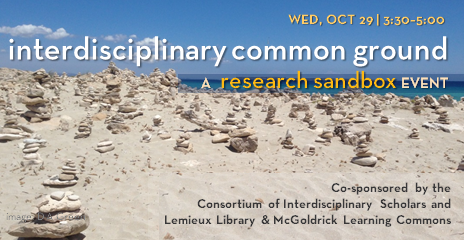
Interdisciplinary common ground: A research sandbox event
October 29, 2014
Co-sponsored by the Consortium of Interdisciplinary Scholars, and the Lemieux Library & McGoldrick Learning Commons
This is the first in our “research sandbox” series of events: a chance for us as faculty to meet over drinks and appetizers to think creatively about our interdisciplinary work and hatch plans for collaboration.
Many of us work at the edge of our disciplines or between disciplines. Either way we have to find common ground between conflicting insights from diverse sources.
“Interdisciplinary common ground is one or more concepts or assumptions through which conflicting insights or theories can be largely reconciled and subsequently integrated, thus enabling collaborative communication between disciplines” (Repko, 2012, p. 322).
What kind of common ground have you found in your work? How do you enable collaborative communication between disciplines? What collaboration would you like to achieve?
Request a consultation on this topic.
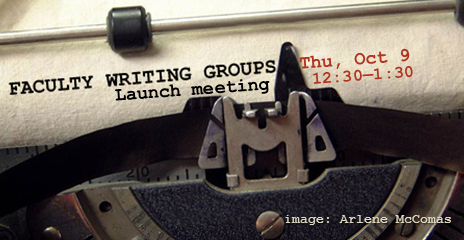
Faculty Writing Groups
LAUNCH MEETING
October 9, 2014
The “research on research” gives us good evidence on what helps faculty progress with their research, and in response, we’ve been launching Faculty Writing Groups since 2007. These groups provide you with camaraderie and accountability to achieve more in your scholarship. And they are intentionally interdisciplinary so that you remain the expert in your own field throughout.
By the end of this session, you will be grouped with two or three other colleagues from across campus and will be ready to meet with your group independently and regularly to help you achieve more in your research – and with less stress.
Find out more about faculty writing groups and see the Center's current offering.
Put your name on a waiting list to join a faculty writing group.
2013-14
Spring 2014
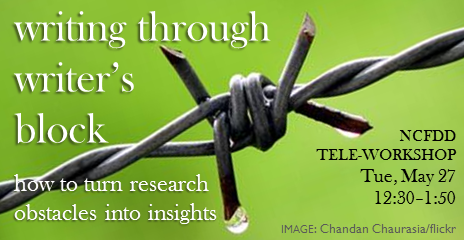
Writing through writer's block: How to turn research obstacles into insights
HOSTED NCFDD TELE-WORKSHOP
May 27, 2014
NCFDD presenter: Naomi Greyser | SU Host: David Green
Please note: This event is a presented by the National Center for Faculty Development and Diversity (NCFDD). This tele-workshop is accessible on the NCFDD website, under Member Resources. The Center for Faculty Development funds an institutional membership to NCFDD for all SU faculty, graduate students and law students. Click here to find out more about Seattle University's institutional membership to NCFDD, including how to become a member of NCFDD.
Many faculty members report feeling stuck in their writing, unsure of where or how to start, setting themselves unrealistic and overwhelming expectations, and unable to respond adequately to reviewers' expectations or critiques.
The litany of negative faculty sentiments around writing makes for intimidating reading: boredom, self-loathing, guilt, shame, avoidance, and pain.
If any of this sounds familiar or reflects your experience with the writing process, you are not alone. It may be useful to regard those writing blocks as opportunities for clarity around your research aims and intellectual investments.
In this guest expert NCFDD tele-workshop, we will explore the multiple forms that writing blocks take, consider challenges that in particular underrepresented faculty may experience in relation to writing, and identify strategies for attending to blocks so as to turn obstacles into insight. Along the way, we will share stories about how incredibly tough writing can be, and develop strategies that will help us sit down with our projects and make progress-writing through writer's block.
Request a consultation on this topic.
Winter 2014
Revise and resubmit: A conversation with journal editors
PANEL DISCUSSION
January 28, 2014
Facilitated by David Green
In many of our disciplines, publishing in scholarly journals is the coin of the realm. Many SU faculty are also deeply invested not only in publishing, but also in reviewing for journals—that hidden and significant contribution to the advancement of their disciplines.
Yet even with this level of professional engagement, what happens behind the scenes in academic journals is often unclear. In the Center for Faculty Development, we regularly have conversations with colleagues wondering how best to communicate with an editor, how to respond to reviewers’ comments, and how faculty can put themselves in the editors’ shoes so that they can be low-maintenance and high-value colleagues.
In this panel discussion, you’ll be able to raise your own questions with journal editors from a range of disciplines here at Seattle University. You’ll hear how different journals handle tricky situations, which parts of the process most matter to the editors, and how you can enhance your reputation across your own disciplinary community.
Request a consultation on this topic.
Fall 2013
Faculty Writing Groups
LAUNCH MEETING
October 16, 2013
The “research on research” gives us good evidence on what helps faculty progress with their research, and in response, we’ve been launching Faculty Writing Groups since 2007. These groups provide you with camaraderie and accountability to achieve more in your scholarship. And they are intentionally interdisciplinary so that you remain the expert in your own field throughout.
By the end of this session, you will be grouped with two or three other colleagues from across campus and will be ready to meet with your group independently and regularly to help you achieve more in your research – and with less stress.
Find out more about faculty writing groups and see the Center's current offering.
Put your name on a waiting list to join a faculty writing group.
Thinking like your editor
FACULTY LEARNING COMMUNITY
13FQ-14WQ
Would you like to write a book about your area of expertise for a broad audience, but you’re not sure where to begin? In this five-session series over Fall and Winter Quarters, you’ll learn some of the trade secrets for writing a successful nonfiction book. We’ll be reading and discussing Thinking Like Your Editor: How to Write Great Serious Nonfiction – and Get It Published, recommended by editors at Harvard University Press, Oxford University Press, and HarperCollins, to name just a few. We won’t be talking about how to write a book for the dozen specialists in your field, but how to write a book that’s sold at regular bookstores and reaches 1,000 or more people a year. Whether you’re already outlining chapters or you’re just toying with the glimmer of a book idea, this faculty learning community can take your thinking and writing where you most need them to go.
Over the course of this 5-part series, you’ll
- set goals for what you want to achieve by the end of Fall and Winter quarters,
- learn insights about the book publishing business,
- work on questions that can help you narrow or broaden (whichever you need more) your thinking on your book,
- analyze a successful book proposal,
- have the support of colleagues who are facing similar issues, and
- make progress on achieving your book writing goals.
You can be at the early thinking stages of your book idea or you can already be writing chapters. We do ask, however, that you come with the intent to work on a nonfiction book project for a broad audience, rather than a niche book for a select group of like-minded specialists or a journal article. We’ll be able to provide the best support for one another if we’re facing similar challenges.
Request a consultation on this topic.
Borrow this book from the Center's Library.
.
2012-13
Spring 2013
Faculty writing groups informational session
LAUNCH MEETING
April 30, 2013
The “research on research” gives us good evidence on what helps faculty progress with their research, and in response, we’ve been launching Faculty Writing Groups since 2007. These groups provide you with camaraderie and accountability to achieve more in your scholarship. And they are intentionally interdisciplinary so that you remain the expert in your own field throughout.
By the end of this session, you will be grouped with two or three other colleagues from across campus and will be ready to meet with your group independently and regularly to help you achieve more in your research – and with less stress.
Find out more about faculty writing groups and see the Center's current offering.
Put your name on a waiting list to join a faculty writing group.
Winter 2013
No research practice events held this quarter.
Fall 2012
Habits of highly successful academic writers
AFTERNOON WORKSHOP
October 23, 2012
Presented by Helen Sword, The University of Auckland, Aotearoa, New Zealand
Co-sponsored by the Office of Research Services and Sponsored Projects (ORSSP)
“Publish or perish” is the mantra of the successful academic. Yet few academics have been explicitly trained as writers, and fewer still have been schooled in the intricate art of maintaining research productivity without sacrificing work-life balance. Helen Sword, author of Stylish Academic Writing, has interviewed more than 70 successful faculty members from across the disciplines to find out about their professional formation as writers, their daily work habits, and their habits of mind. In this interactive workshop, she will present a smorgasbord of evidence-based strategies for colleagues who aspire to write more confidently, stylishly, engagingly, daringly, or simply more prolifically.
Helen Sword is associate professor in the Centre for Academic Development at the University of Auckland, Aotearoa New Zealand. She works with faculty from across the disciplines on a variety of teaching and research initiatives, as well as continuing to teach in literary studies. She holds a PhD in Comparative Literature from Princeton University. Her most recent publication is Stylish Academic Writing from Harvard University Press (2012).
Borrow this book from the Center's Library.
Faculty writing groups informational session
LAUNCH MEETING
October 3, 2012
The “research on research” gives us good evidence on what helps faculty progress with their research, and in response, we’ve been launching Faculty Writing Groups since 2007. These groups provide you with camaraderie and accountability to achieve more in your scholarship. And they are intentionally interdisciplinary so that you remain the expert in your own field throughout.
By the end of this session, you will be grouped with two or three other colleagues from across campus and will be ready to meet with your group independently and regularly to help you achieve more in your research – and with less stress.
Find out more about faculty writing groups and see the Center's current offering.
Put your name on a waiting list to join a faculty writing group.
2011-12
Spring 2012
Faculty writing groups informational session
April 25, 2012
Winter 2012
No research practice events held this quarter.
Fall 2011
Rigorous enough to publish: Turning your teaching into a research project
Therese Huston | November 8 or 9, 2011
Request a consultation on this topic.
Faculty writing groups informational session
October 6, 2011
2010-11
Spring 2011
Faculty writing groups informational session
April 21, 2011
Writing, procrastination, and resistance: How to identify what's holding you back and move through it
April 8, 2011
Presented by Kerry Ann Rockquemore (National Center for Faculty Development and Diversity)
Co-sponsored by the Office of the Provost and Albers School of Business and Economics
Winter 2011
No research practice events held this quarter.
Fall 2010
Faculty writing groups informational session
October 13, 2010
2009-10
Spring 2010
Faculty writing groups informational session
April 15, 2010
Winter 2010
No research practice events held this quarter.
Fall 2009
No research practice events held this quarter.
2008-09
Spring 2009
No research practice events held this quarter.
Winter 2009
Generating outside funding
January 30, 2009
Presented by Leesa Brown (Sponsored Research), Barbara Dolby, and Jane Spalding (University Advancement)
Request a consultation on this topic.
Fall 2008
Faculty writing groups informational session
October 15, 2008
More information coming soon; check back here later!